

JFNA’s Eric Fingerhut shares plans for Jewish communal actions in a post-Oct. 7 world

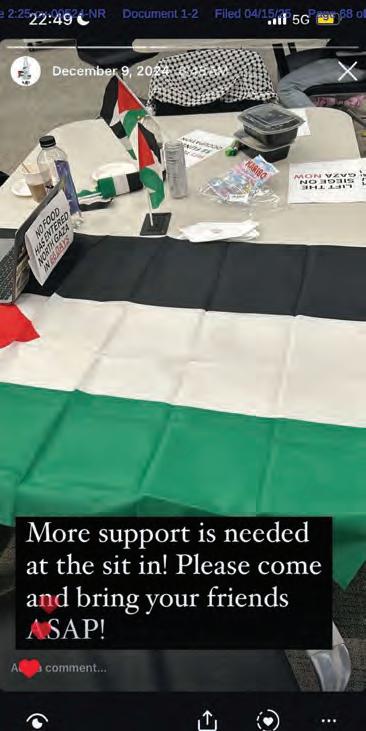


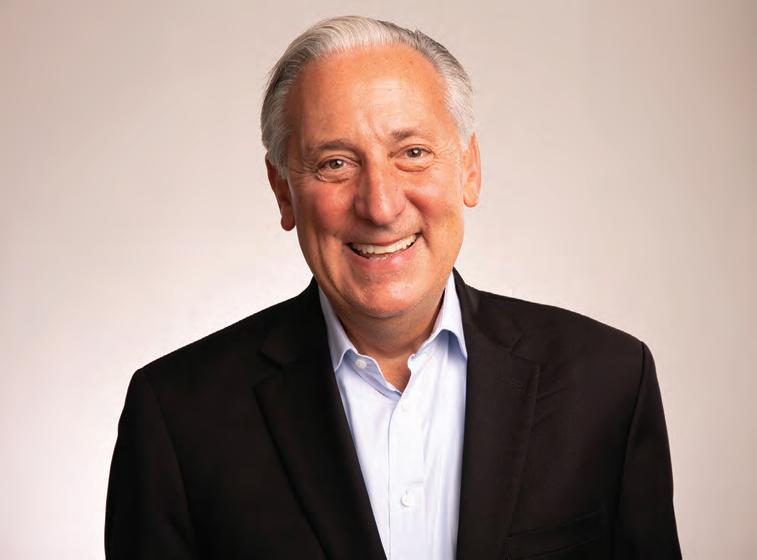
Efor the Federation system — since 2019. A former U.S. congressman from Ohio, Fingerhut has helped the JFNA navigate through uniquely difficult times, including the pandemic, an increasingly divisive political climate and the aftermath of Hamas’ Oct. 7 attack in Israel.
While in town last week to meet with Jewish Federation of Greater Pittsburgh’s lay leaders and staff, he spoke with the Chronicle about Jewish communal challenges — as well as opportunities — in a post-Oct. 7 world.
The interview has been edited for length and clarity.
Has your vision for the Jewish communal world changed since Oct. 7?
That’s a great question. I don’t think it’s changed, but I think that the need for an organized communal response that bridges all factions of our community has become more important than ever, because the challenges that have arisen as a result of Oct. 7, both in Israel and here at home, are bigger than any one organization and bigger than any one part of our community. Our responsibility in the Federation system is to be the convener that brings everyone together and mobilizes collective responses.
There are times — especially when times are good — that people don’t see the need for that
level of communal organization. But I think everybody recognizes it now. So I wouldn’t say my vision has changed, but I do think the sense of responsibility that we have to this moment is at a very high level. We know that the community needs to be brought together across differing religious and political and ideological lines, to work together for the common good, and so it’s a very significant responsibility — and frankly, there’s a lot of pressure to get it right. You phrased the question as “since Oct. 7,” but there’s no doubt that we’re sitting here at a moment that is probably the most challenging since Oct. 7. This is now the longest war in Israel’s history. We still have our hostages being held prisoner in Gaza. The political divisions here at home are growing and there are also the issues, the questions, about Israel’s policies intersecting with American political partisanship, which is extreme. So this is a very challenging moment for our community, and therefore, I think we have a huge responsibility here at the Pittsburgh Federation — and also at the Jewish Federations of North America — to be bringing our community together to find those collective responses that will help us get through this moment.
What is the JFNA doing to address the divide between Diaspora Jews and Israeli Jews?
Since Oct. 7, our primary focus in Israel has been to assist with the emergency needs that have arisen and continue to arise as a result
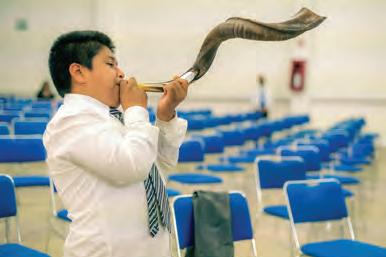
By Adam Reinherz | Senior Sta Writer
Rosh Hashanah begins the evening of Sept. 22. For weeks, Jewish Pittsburgh has been preparing.
Through classes, contemplation, shofar blasts and even yoga, local residents have readied for the new year.
On Aug. 25, community members gathered at the Jewish Community Center in Squirrel Hill to celebrate the start of the Hebrew month of Elul. The 29-day period of introspection is marked by various practices, including the recitation of seasonal liturgy and blowing the shofar.
Through a program operated in conjunction with the 10.27 Healing Partnership, rabbis Hindy Finman and Alex Greenbaum encouraged participants to read and wrestle with Jewish texts.
The topics, as Finman explained, concerned relationships and the inherent challenges of unity and forgiveness.
“What does it mean to take an intentional pause from a relationship?” she asked.
A classic Chassidic tale recounts a father

Sculptor Dan Droz's
Readying for the High Holidays
Photo by Israel Torres via Pexels
Eric Fingerhut
Photo courtesy of JFNA
Headlines
Anti-Zionist group’s suspension from Pitt lifted by federal judge
By David Rullo | Senior Staff Writer
The University of Pittsburgh must immediately reinstate the local chapter of Students for Justice in Palestine, a federal judge ruled Thursday.
The university suspended the group in March for six months, saying it had improperly attempted to influence a disciplinary committee while it was deliberating on whether an SJP-sponsored event at Hillman Library violated university policies.
U.S. District Judge J. Nicholas Ranjan granted SJP’s motion for a preliminary injunction, finding that the university violated the anti-Zionist group’s free speech rights when it issued its suspension.
SJP has a long history of anti-Zionist and anti-Israel protests and rallies, including taking part in a 2024 encampment on university property. It has promoted boycott movements against Israel on social media, accused Israel of “genocide” and reposted several unsubstantiated and incendiary claims against the Jewish state.
The lawsuit centered on an open letter penned by SJP members in March in response to a Feb. 4 disciplinary hearing concerning a December “study-in” at Hillman Library. At the study-in, SJP members displayed pro-Palestinian messages, draped Palestinian flags over library tables and wore keffiyehs. Pitt police officers were called to break up SJP’s event, and disciplinary charges were filed.
The open letter, signed by various university and community groups, was sent to, among others, hearing officers deliberating on the disciplinary proceedings. In the letter, SJP said it was the “only Palestinian cultural and advocacy organization on campus—led by Palestinian, Arab, and Muslim students,” and alleged it was being “unfairly targeted with heightened scrutiny and politically driven disciplinary actions.”
The letter also alleged that the university’s actions “disproportionately penalize students
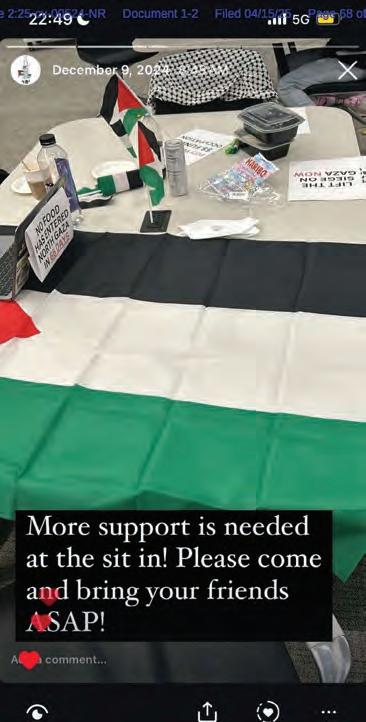
Justice in Palestine, promoting the “study-in” at Hillman Library in December Exhibit 14, verified complaint, Students for Justice in Palestine at Pitt v. University of Pittsburgh, et al.
of color for speaking out against apartheid and state violence but also set a dangerous precedent that will erode the free speech and organizational rights of all Pitt affiliates.”
The university said SJP violated two rules set forth in its Student Code of Conduct. Pitt suspended the organization until Sept. 18, alleging that the group was attempting to improperly influence the disciplinary procedure and intimidate the hearing officers.
SJP’s case was picked up by the American Civil Liberties Union, which filed a lawsuit against the university alleging Pitt violated the group’s First Amendment rights.
In June the group filed a revised motion
for preliminary injunctive relief, seeking an immediate termination of the suspension, arguing the club would be irreparably harmed if it was “precluded from recruiting new student members during Welcome Week, beginning August 18, when new students will have the opportunity to learn about the various registered student organization and how they can get involved.”
Despite the case not being heard until after the conclusion of Welcome Week, Ranjan agreed that the suspension caused SJP irreparable harm.
“Pitt has informed SJP that, during the suspension, it cannot gather as an organization or recruit other members. That seriously and presently infringes SJP’s rights of association and speech, particularly at this time of year, as the academic year begins,” Ranjan wrote in his three-page decision.
The university, however, would suffer no harm by lifting the suspension a few weeks earlier than planned, the judge ruled.
Ranjan, who was appointed to the federal bench in 2028 during the first Trump administration, wrote that public interest also would be served by “increasing the level of association and free speech on campus.”
The public, Ranjan wrote, is served through the integrity of conduct hearings at a public university. He indicated that Pitt should refine its code of conduct writing, “the integrity of the conduct hearing must be furthered by a more refined and tailored rule.”
During the hearing, university council Joshua W. B. Richards argued that SJP’s open letter was not protected speech, but rather was meant to intimidate the officers deciding the case. To illustrate his point, he cited an email written by one of the officers alleging that SJP was attempting to influence him and his decision.
The open letter, Richards argued, was akin to a defendant attempting to intimidate or influence a juror in a criminal case. He added that, like a criminal defendant, SJP was given due process.
SJP’s attorneys pushed back on Richard’s

SUBSCRIPTIONS
subscriptions@pittsburghjewishchronicle.org 412-687-1000, ext. 2
TO ADVERTISE
advertising@pittsburghjewishchronicle.org 412-687-1000, ext. 1
EDITORIAL DEPARTMENT
Email: newsdesk@pittsburghjewishchronicle.org
BOARD OF TRUSTEES
Evan H. Stein, Chair
Evan Indianer, Vice Chair
Derek Smith, Treasurer
Gayle R. Kraut, Secretary
Gail Childs, Dan Droz, Malke Steinfeld Frank, Seth Glick, Tammy Hepps, Judith Kanal, Cátia Kossovsky, Charles Saul
GENERAL COUNSEL
Stuart R. Kaplan, Esq.
Jim Busis, CEO and Publisher 412-228-4690 jbusis@pittsburghjewishchronicle.org
EDITORIAL
Toby Tabachnick, Editor 412-228-4577 ttabachnick@pittsburghjewishchronicle.org
Adam Reinherz, Senior Staff Writer 412-687-1000 areinherz@pittsburghjewishchronicle.org
David Rullo, Senior Staff Writer 412-687-1000 drullo@pittsburghjewishchronicle.org
ADVERTISING
arguments, saying that unlike a civil or criminal case, the university ran the entire disciplinary process, including selection of the hearing officers — which included no students, essentially denying SJP a jury of its peers.
The judge ultimately agreed with attorney Witold Walczak, the ACLU’s Pennsylvania legal director, concluding that “the jury-tampering cases Pitt cites are legally inapposite to a quasi-administrative university conduct proceeding, and factually inapposite given the content and type of communication here.”
Ranjan also ruled against the university’s request for sanctions against SJP for what Pitt said was a “failure to preserve evidence.”
The request, Ranjan wrote was, “immaterial to the disposition of the preliminary-injunction motion.” While acknowledging the court had some concerns about SJP’s failure to preserve evidence, the alleged violations did not rise to a level “requiring an adverse inference or denial of the preliminary-injunction motion.”
Jared Stonesifer, Pitt’s senior director of external communications, said in a written statement to the Chronicle, that “Pitt is committed to maintaining a campus community where free speech is affirmed and free expression is assured. We will comply with the order issued on Thursday but cannot comment further as litigation is ongoing.”
The preliminary injunction is not the end of the dispute between SJP and the university, as there are still outstanding claims that have not been resolved. A trial date has not been set, but Ranjan urged the two parties to settle their differences.
“One last thing,” he wrote. “The Court encourages the parties to put their disputes, including what remains of this case, to rest. This entire dispute could have been handled differently … Hindsight’s 20/20. But it may be time to ratchet things down and get back to campus for a fresh start to the academic year.”
PJC
David Rullo can be reached at drullo@ pittsburghjewishchronicle.org.
Amy Weiss, Account Executive (412) 613-0697 aweiss@pittsburghjewishchronicle.org 5915 Beacon St., 5th Floor
Main phone number: 412-687-1000 Subscriptions: 412-687-1000, ext. 2
PRODUCTION
Jeni Mann Tough Production Manager
Carl Weigel Art/Production Coordinator Subscriptions subscriptions@pittsburghjewishchronicle.org 412-687-1000, ext. 2
Published every Friday by the Pittsburgh Jewish Publication and Education Foundation 5915 Beacon St., 5th Floor Pittsburgh, PA 15217
Phone: 412-687-1000
POSTMASTER: Send address change to PITTSBURGH JEWISH CHRONICLE, 5915 BEACON ST., 5TH FLOOR PITTSBURGH, PA 15217 (PERIODICAL RATE POSTAGE PAID AT PITTSBURGH, PA AND AT ADDITIONAL MAILING OFFICES) USPS 582-740
Manuscripts, letters, documents and photographs sent to the Pittsburgh Jewish Chronicle become the property of this publication, which is not responsible for the return or loss of such items.
The Pittsburgh Jewish Chronicle does not endorse the goods or services advertised or covered in its pages and makes no representation to the kashrut of food products and services in said advertising or articles. The publisher is not liable for damages if, for any reason whatsoever, he fails to publish an advertisement or for any error in an advertisement. Acceptance of advertisers and of ad copy is subject to the publisher’s approval. The Pittsburgh Jewish Chronicle is not responsible if ads violate applicable laws and the advertiser will indemnify, hold harmless and defend the Pittsburgh Jewish Chronicle from all claims made by governmental agencies and consumers for any reason based on ads appearing in the Pittsburgh Jewish Chronicle
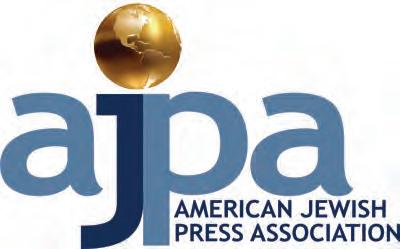
Headlines
Homeowner finds swastika, German eagle tiled into home
By David Rullo | Senior Sta Writer
Lynn Rae Wentworth thought she had found her dream home.
Wentworth, who grew up in Beaver County, moved to Washington, D.C. for college, where she met her husband. When they moved back to the area, they lived with her parents while looking for their “forever home.”
They thought they realized that goal when a house in Beaver became available.
“We looked at it and it sat on the market for a little while, and we went back and looked again and we finally decided we’d like to buy the house and redo it,” she said.
Wentworth calls herself a “historical house person.” Her husband, she said, is a “new construction person.”
The pair believed they found the best of both worlds: The house had the historical facade she was interested in while satisfying her husband’s itch to work on the inside and add onto it.
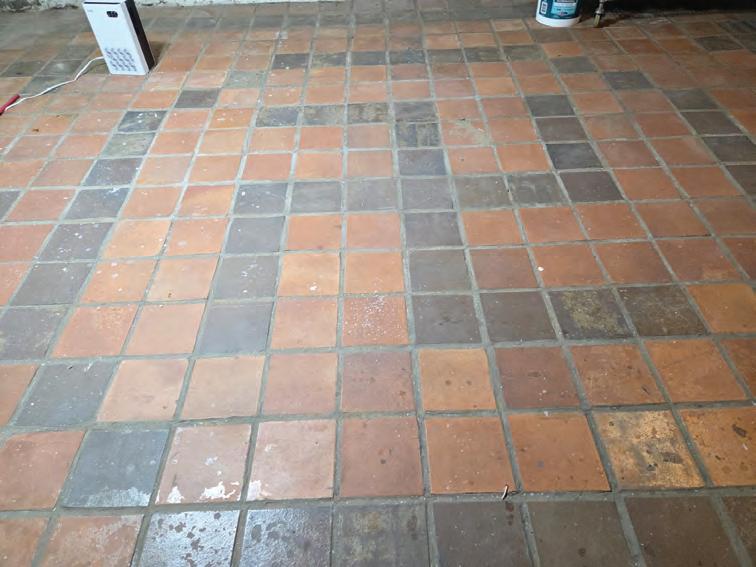
potential buyer backed out and, despite the lack of a home inspection — which the former homeowner wouldn’t entertain — felt they had seen the house enough to feel comfortable buying it.
Pro-Palestinian professor sues Pitt for retaliation and discrimination
called in to intervene on Zionist [] violence with the indigenous people of Palestine,” and called for her immediate resignation as interim dean.
“We had been through it with a contractor and had scrutinized the disclosure statement,” Wentworth said. “We knew there was potentially lead paint. We read it from the perspective of those things you would look at, if the house was going to fall down or if
there was something wrong with it.”
What the couple didn’t expect — what they didn’t even know they should look for — were hate symbols built into the home.
Shortly after moving into the house, Wentworth said, her nephew was working in the basement and pulled up a carpet remnant from the floor. A heavy table had been sitting on it when the couple initially looked at the home. Working in close proximity to the floor, her nephew didn’t notice anything peculiar, but when Wentworth made her way down the stairs and saw the floor from above, she noticed something tiled into it.
“I was like, ‘Oh, my gosh. That’s a swastika,’” she said. “I freaked out. My husband freaked out. I called my parents. We freaked out and were fit to be tied.”
It wasn’t just a swastika that was revealed, however. A Reichsadler eagle — a symbol associated with Nazi Germany — was also tiled into the floor.
After a call to their realtor confirmed they could not return the house, the couple sued the former homeowner, believing that the
Parkinson’s Symposium
By Toby Tabachnick | Editor
Aprofessor in the University of Pittsburgh’s School of Education is suing the university and Dean Eboni M. Zamani-Gallaher, claiming he was removed from leadership positions as retaliation for his support of Palestinians, and because of his sex and sexual orientation.
T. Elon Dancy II is a tenured professor at the university’s Center for Urban Education — which is within Pitt’s School of Education — who focuses on Black intellectual thought; boys, men and masculinities; and structural oppression, according to his Pitt bio.
Dancy asserts in his complaint that he was promoted in 2020 to serve as associate dean for Equity and Justice in the School of Education and executive director of the CUE. He also held the position of Helen S. Faison endowed chair. According to his complaint, filed in federal court, Dancy “identifies as a Black, gay man, who is married to a man of Islamic faith.”
In January, 2024 — three months after Hamas terrorists invaded Israel, murdering 1,200 people and taking more than 250 hostage — a group of students, prospective students and university affiliates signed a letter to ZamaniGallaher as part of the “University of Pittsburgh School of Education Palestinian Solidarity Collective” (‘the Collective’),” according to Dancy’s complaint. The letter demanded that the university’s School of Education increase educational efforts and programming regarding the Hamas/Israel war. The letter also stated that programming facilitated by Dancy, titled “Gaza for Educators and Organizers,” was the “only action of this type” in the School of Education.
Zamani-Gallaher responded to the letter three days later, according to the complaint. Unsatisfied with her response, the Collective accused her of being “asleep at the wheel when
In a letter co-authored by Dancy to senior Pitt administrators, he wrote: “We read the letters as students holding us accountable to the university’s role in global liberation against antiblackness (and its genocidal expressions) through curriculum, pedagogy, and institutional organization,” according to the complaint.
Dancy further alleges the Zamani-Gallaher attempted to dissuade a graduate student from working under his direction.
Dancy then filed a complaint in the university’s Title IX office.
In May 2024, Zamani-Gallaher initiated an external review of the CUE, and, Dancy alleges, included a “former dean who had expressed disdain for CUE’s programming, indicating that he would withdraw philanthropic support and disagreeing with Dr. Dancy’s use of the term ‘genocide’ to describe circumstances in Gaza.”
Dancy objected to the inclusion of that former dean, and also to the external review’s conclusions. While in the midst of scheduling a time to discuss the review with ZamaniGallaher, he alleges, she “removed him from his position as CUE Director and Helen S. Faison Endowed Chair.” Dancy then filed a complaint with the Equal Employment Opportunity Commission.
He alleges he was replaced by two “less qualified” females.
Dancy claims he was removed from his position because of his “his political affiliation and/or beliefs” and in violation of his constitutional rights. He further claims he was removed from his positions because of his sex and sexual orientation, and in retaliation for filing a complaint with the EEOC.
The university declined to comment on the case. PJC
Toby Tabachnick can be reached at ttabachnick@pittsburghjewishchronicle.org.
Encompass Health Rehabilitation Hospital of Harmarville 320 Guys Run Road Pittsburgh, PA 15238
Join Encompass Health and To Life! Therapy and Wellness for a Parkinson’s Symposium. Hear from speech therapists, dietitians, physical therapists, nurses, and more about managing Parkinson’s disease.
Lunch is included.

To register, scan or click here or call 412.925.2018
Homeowner Lynn Rae Wentworth was shocked to discover a tiled swastika beneath a rug in the home she recently purchased.
Photo by David Rullo Please
Swastika
Headlines
Start of school year brings buzz back to The Second Floor
By Adam Reinherz | Senior Sta Writer
Acherished space has reopened with fanfare and friends. The Second Floor, which functions as a coffee shop, lounge and workspace for teens, began another year of engagement on Sept. 2.
Located inside the Jewish Community Center in Squirrel Hill, the chalkboard-lined room with comfortable coaches, small tables and numerous kosher snacks is a beacon for local adolescents.
Last year, according to its director Maria Carson, The Second Floor welcomed 645 young people.
Though most teens hailed from the neighborhood — and attended area schools including Pittsburgh Colfax K-8, Pittsburgh Allderdice High School, Community Day School and Hillel Academy of Pittsburgh — several members traveled via bus from non-walkable locales, Carson said.
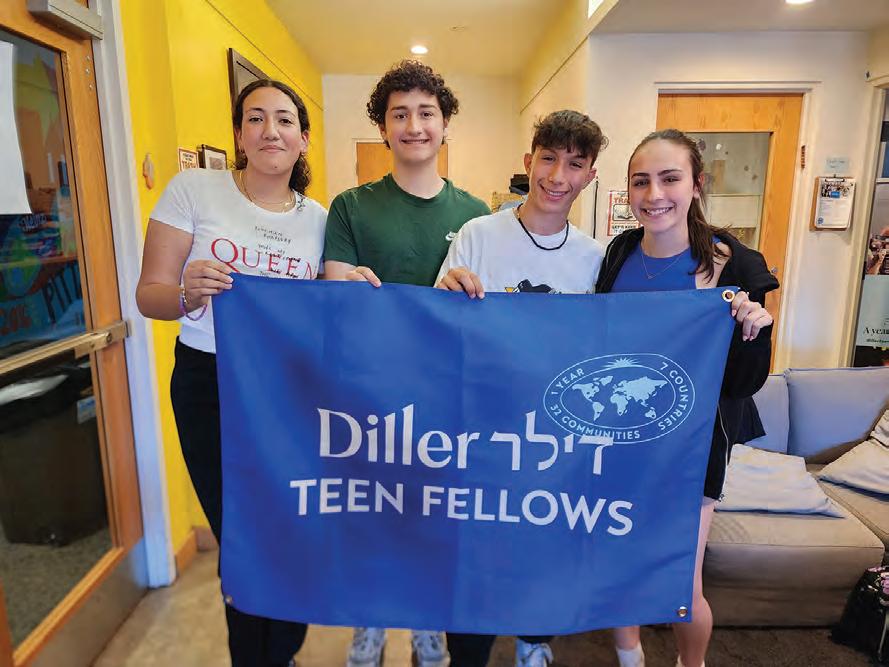
Unlike the JCC, which employs a fee-based membership, The Second Floor is free for teens.
All that’s required, Carson said, is completing a form and obtaining parental permission. Once that process is complete, teens can access the space and the site’s numerous programs.
Most offerings — like self-defense through Krav Maga and clubs dedicated to creating change, Shabbat crafting and playing Dungeons & Dragons — are free. A few programs, including the Diller Teen Fellowship and middle school and high school musical, have a fee. Some programs even pay teens to participate, like the Visions of Peace fellowship where participants learn how Jewish thinkers conceptualize peace in the Middle East, or the She’elot fellowship where teens probe Jewish texts for meaning.
Shalom yinz
Carson described 12 programs The Second Floor will offer during the 2025-
2026 academic year.
Each program serves to ignite the interests of a diverse populace.
The young people entering the space arrive from “all sorts of backgrounds,” she said. “Anyone can come and participate in our programs. Anyone could come and be an intern if they fulfill certain age requirements and apply.”
The key, Carson continued, is that The Second Floor is a “Jewish space, regardless if everyone who walks through our doors is Jewish.”
Given its lounge-like setting and annexed classroom, The Second Floor supports multiple uses. Staff-led classes are dedicated to rabbinic and biblical texts or Israel.
One-off events celebrate the Jewish holidays. Only kosher certified food is served on site (Carson keeps paper plates and disposable utensils on hand for individuals who prefer not to use The Second Floor’s dishes).
“The Second Floor aims to serve as


a hub for Jewish engagement in our community,” Rachael Speck, JCC’s chief program and innovation officer said. “What is so wonderful about it is that it is open and accessible to teens of all backgrounds, but it aims to connect them socially and educationally to the Jewish community here in Pittsburgh.”
Both Carson and Speck described The Second Floor as a bridge builder. Yet as much as it introduces teens to Jewish writings and ideas, The Second Floor facilitates more intimate connections.
The space, Carson explained, is predicated on creating relationships and fostering a sense of self.
Those ends occur during a critical period, literally and figuratively, she added.
See you after school
Researchers point to after-school hours — specifically those between 3 and 6 p.m. — as delivering key moments for teens.
A study following British adolescents found that nearly a third of after-school hours were spent on phones, tablets and other devices. The danger of “sedentary screen-time,” authors noted, was its association with adverse health outcomes, including obesity, insulin resistance and depression.
staff, “our space really matters.”
Most young people don’t always want to share every detail of their lives with their parents, she continued. “We’re also here to support them through that journey.”
Be here
Carson, like others who work with teens, referenced numerous challenges experienced by the demographic.
With teens reporting higher rates of loneliness and social isolation, being a supportive presence is crucial, she said.
“The single most powerful force for adolescent mental health is strong relationships with caring adults,” Lisa Damour, a clinical psychologist at Case Western Reserve University told the American Psychological Association in April.
Young adults without social support were more likely to report anxiety, depression, poor sleep quality and “very low life satisfaction,” noted the Centers for Disease Control and Prevention. The irony, continued researchers, is that while nearly 42% of teens told the CDC they lacked necessary social
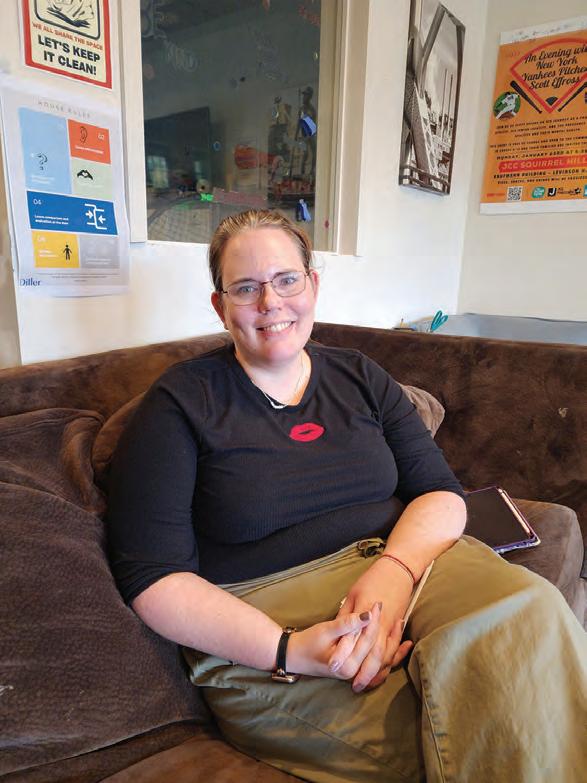
Once the school day ends, 1 in 5 children are left to care for themselves, the Salvation Army reported.
Parents, educators and policy makers must recognize the dangers presented between 3 and 6 p.m., as those are a peak period for “juvenile crime and experimentation with drugs, alcohol, cigarettes and sex,” according to Afterschool Alliance, a Washington D.C.based research and advocacy group.
Teens need “a place to go after school,” Carson said. Whether they come here and connect among themselves or with
entrants and questions, Carson said. For those who pull open the doors, “I hope we can encourage them to not just come and enjoy the space, but also to actually engage in one of our programs.”
Engagement can teach them “something about Judaism, whether or not they are Jewish.” And it helps them “make connections,” she continued, “with the staff and with other teens.” PJC
Adam Reinherz can be reached at areinherz@pittsburghjewishchronicle.org.
Maria Carson directs The Second Floor.
Photo by Adam Reinherz
Pittsburgh and Israeli teens gather at The Second Floor during a Diller Teen Fellowship meetup.
Photo by Adam Reinherz
Headlines



France and Saudi Arabia about brokering a two-state solution.
By Grace Gilson | JTA
Secretary of State Marco Rubio announced last week that he is “denying and revoking” the visas of Palestinian officials ahead of the United Nations General Assembly this month.
The unprecedented move will prevent members of the Palestine Liberation Organization and the Palestinian Authority from attending the General Debate where several countries, including Australia, Canada, France, Belguim and the United Kingdom, have announced plans to recognize Palestinian statehood.
“The Trump Administration has been clear: it is in our national security interests to hold the PLO and PA accountable for not complying with their commitments, and for undermining the propects for peace,” Rubio said in a statement.
The move represents a major break with precedent. The United States typically allows foreign leaders to attend U.N. meetings even if they are on the outs with the U.S. government. Iranian officials and Russian officials have regularly attended meetings at the U.N., for example.
But the Trump administration has shown unusual willingness to use its visa-granting authority to advance an ideological agenda, including by revoking the visas of students who participated in pro-Palestinian protests at their universities.
PA President Mahmoud Abbas said the revocation “stands in clear contradiction to international law” in a statement urging the United States to reconsider the move. Abbas was recommended to be included in the ban, according to an internal State Department memo obtained by the New York Post.
Abbas was also expected to attend a highlevel meeting on Sept. 22 co-chaired by
Abbas, 89, is widely seen as essential to developing any plan for postwar governance in Gaza. He has shown willingness to have PA security forces cooperate with the Israeli security forces and, in June, condemned Hamas’ Oct. 7, 2023, attack on Israel for the first time.
In his statement, Rubio called on the PA to “end its attempts to bypass negotiations through international lawfare campaigns, including appeals to the ICC and ICJ, and efforts to secure the unilateral recognition of a conjectural Palestinian state.”
The Palestinian ambassador to the U.N., Riyad Mansour, told reporters that he was assessing how the move would apply to his delegation, adding that they would “respond accordingly.”
Israel’s foreign minister, Gideon Saar, applauded the move. Israel opposes any efforts to create a Palestinian state.
“Thank you @SecRubio for holding the ‘PLO’ and PA accountable for rewarding terrorism, incitement and efforts to use legal warfare against Israel,” he tweeted. “We thank @POTUS and the Administration for this bold step and for standing by Israel once again.”
Rubio’s move, announced on the Friday of Labor Day weekend, did not immediately ignite widespread reactions from Jewish groups. But it drew strong condemnation from Hadar Susskind, the president and CEO of New Jewish Narrative, a progressive Zionist organization.
“The Trump administration is doing more than just shooting itself in the foot. It is playing into the hands of Hamas,” said Susskind in a statement. “A better future for Israelis and Palestinians depends on the establishment of a Palestinian state. We want that state to be led by political factions that recognize Israel. That’s who governs the Palestinian Authority. That’s who the Trump administration is denying entry to.” PJC
APPETIZERS
GEFILTE FISH
ORANGE DILL SALMON
CHOPPED LIVER
SOUPS
CHICKEN SOUP
CHICKEN NOODLE SOUP
MUSHROOM BARLEY SOUP
MATZO BALLS
KREPLACH
SIDE DISHES
KASHA AND BOWS
CARROT AND PRUNE TZIMMES
CANDIED SWEET POTATOES
FARFEL AND MUSHROOMS
GLAZED BABY CARROTS
ROASTED VEGETABLES
POTATO KNISH
WILD RICE & CRANBERRIES
VEGETABLE KISHKI
MAIN DISH
BRISKET SINGLE
ROASTED CHICKEN LEG
ROASTED CHICKEN BREAST
SHERRY MUSHROOM CHICKEN
BONELESS BREAST
ROASTED TURKEY BREAST HALF
ROASTED TURKEY LEG (DRUM & THIGH)
STUFFED CABBAGE # OF PIECES
STUFFED BONELESS TURKEY BREAST
KUGELS
POTATO KUGEL
NOODLE KUGEL
APPLE KUGEL
ZUCCHINI KUGEL
GLUTEN-FREE POTATO KUGEL
IS MONDAY SEPTEMBER 15, 2025

Chicken Legs
Uruguay Boneless Rib Steak
ROSH HASHANAH MENU
p Secretary of State Marco Rubio
Photo by Kevin Dietsch/Getty Images
Calendar
Submit calendar items on the Chronicle’s website, pittsburghjewishchronicle.org. Submissions also will be included in print. Events will run in the print edition beginning one month prior to the date as space allows. The deadline for submissions is Friday, noon.
SUNDAY, SEPT. 7
Join Chabad of the South Hills for Jewish New York. Visit the Rebbe’s resting place, enjoy a Crown Heights tour, shopping, Chabad world headquarters and a delicious kosher restaurant. Flight and dinner purchased individually. $125. chabadsh.com/jny.
SUNDAYS, SEPT. 7-DEC. 28
Join Chabad of Squirrel Hill for its Men’s Tefillin Club. Services and tefillin are followed by a delicious breakfast and engaging discussions on current events. 8:30 a.m. 1700 Beechwood Blvd. chabadpgh.com.
Join a lay-led online Parashah study group to discuss the weekly Torah portion. No Hebrew knowledge needed. The goal is to build community while deepening understanding of the text. 8:30 p.m. For more information, visit bethshalompgh.org/online-parashah.
MONDAYS, SEPT. 8-29
Join the 10.27 Healing Partnership for Roll for Insight: Community-Building Role-Playing Games Meet every other week to connect and grow with new friends through playing tabletop role-playing games designed to inspire emotional depth. They will use RPGs to explore the intersection of identity, emotional resiliency and games to fight isolation and disconnection, and to meet new people and form friendships. Free. No experience required. 16 and up. 5:30 p.m. Jewish Community Center, 5738 Forbes Ave. 1027healingpartnership.org/rpg-club.
MONDAYS, SEPT. 8-DEC. 29
Join Congregation Beth Shalom for a weekly Talmud study. 9:15 a.m. For more information, visit bethshalompgh.org.
Join Temple Sinai for an evening of mahjong every Monday (except holidays). Whether you are just starting out or have years of experience, you are sure to enjoy the camaraderie and good times as you make new friends or cherish moments with long-term pals. All are welcome. Winners will be awarded Giant Eagle gift cards. All players should have their own mahjong cards. Contact Susan Cohen at susan_k_cohen@yahoo.com if you have questions. $5. templesinaipgh.org.
TUESDAY, SEPT. 9
Join StandWithUs for its Pittsburgh Community Reception. Speakers and honorees include keynote speaker Luai Ahmed, student honorees Miriam Levari and Harrison Romero, community honoree the Pittsburgh Jewish Chronicle and a conversation with Rona Kaufman. 5:30 p.m. Location given upon registration. standwithus.com/2025-pittsburgh-event.
TUESDAYS, SEPT. 9, 16
Tree of Life Congregation will be o ering a series of classes to prepare for the upcoming High Holidays. In these sessions led by Rabbi Je rey Myers, attendees will view the film “Bruce Almighty,” followed by discussion questions. Free. 7 p.m. Rodef Shalom Congregation, 4905 Fifth Ave. treeoflifepgh.org.
WEDNESDAY, SEPT. 10
The Holocaust Center of Pittsburgh presents “Inseparable: A Presentation by Holocaust Survivor Marion Lewin.” Born in Holland, Lewin survived the concentration camp Bergen-Belsen with her parents and twin brother. One of a handful of families who survived the Holocaust intact, they arrived in New York City in 1947. Today Marion and her brother, according to available data, are the only surviving twins of the Holocaust. 6:30 p.m. Rodef Shalom Congregation, 4905 Fifth Ave. hcofpgh.org/ event/save-the-date-presentation-by-marion-lewin.
Bari Weiss, Pittsburgh native and founder of The Free Press, hosts a debate about one of the most pressing moral questions of our time: Is designing babies unethical — or a moral imperative? 7 p.m.; $40. Byham Theater, 101 6th Street. trustarts.org/ production/103133.
Enjoy tea while exploring Chana’s prayer at Chabad of Squirrel Hill’s Torah and Tea. 7 p.m. Email caltein@chabadpgh.com for address. chabadpgh.com/tea.
WEDNESDAYS, SEPT. 10, 17; OCT. 22
Join JFCS for Lunch & Learn: Supportive Parenting for Anxious Childhood Emotions (SPACE), a three-part series designed to empower parents and guardians with skills, tools and confidence to support children with anxiety. All sessions are open to parents/guardians of school age children aged 7-18 still living in the home with a recognized anxiety disorder. Free. 1 p.m. Virtual through Zoom, link provided with registration. jfcspgh.org/event/lunch-learn-supportive-parentingfor-anxious-child.
WEDNESDAYS, SEPT. 10-DEC. 31
Temple Sinai’s Rabbi Daniel Fellman presents a weekly Parshat/Torah portion class on site and online. Call 412-421-9715 for more information and the Zoom link.
Bring the parashah alive and make it personally relevant and meaningful with Rabbi Mark Goodman in this weekly Parashah Discussion: Life & Text. 12:15 p.m. For more information, visit bethshalompgh.org/life-text.
Join Chabad of the South Hills for Baby Loves Shabbat, music and movement for ages 0 to 3. Challah making and Shabbat songs. 3:45 p.m. 1701 Bower Hill Road. chabadsh.com.

THURSDAY, SEPT. 11
Join Chabad of Squirrel Hill for a men’s Farbrengen a meaningful and uplifting evening in preparation for the High Holidays with lively Chassidic melodies accompanied by local musicians. $10. 7:30 p.m. 1700 Beechwood Blvd. chabadpgh.com/farbreng.
SUNDAY, SEPT. 14
Come join Chabad of Squirrel Hill for a women’s mini retreat — a day of exciting workshops, crafts and words of inspiration to help prepare for the High Holidays. $54. 11 a.m. 1700 Beechwood Blvd. chabadpgh.com/retreat.
The University of Pittsburgh Jewish Studies Program and Rauh Jewish Archives present “O erings of Grief, O erings of Rage: Revisiting Tree of Life Synagogue and George Floyd Square.” Laura Levitt will explore how people individually and collectively grieve after mass, public tragedies. Her talk will illustrate how the memorial items at the George Floyd and Oct. 27 memorials, when viewed together, can teach us about racism and antisemitism. 5 p.m. JCC Katz Auditorium, 5738 Forbes Ave. 1027healingpartnership.org/event/ lauralevitt.
MONDAY, SEPT. 15
Join Chabad of the South Hills for Ladies Pre-High Holiday Fashion Show, an elegant evening where Torah wisdom meets trending style. Refreshments served. 7 p.m. $10 in advance/$15 at the door. The Grey Parrot, 320 Castle Shannon Blvd. Chabadsh. com/ladies.
MONDAY, SEPT. 15–WEDNESDAY, SEPT. 17
The Eradicate Hate Global Summit brings together the world’s top minds to build relationships and solutions to reduce hate-fueled violence. 9 a.m., David L. Lawrence Convention Center, 1000 Fort Duquesne Blvd. eradicatehatesummit.org.
THURSDAYS, SEPT. 18, NOV. 6, JAN. 15, MARCH 12, APRIL 30, JUNE 25
In the ever-evolving landscape of legal practice, understanding the interplay between faith and governance is crucial for lawyers. Join Rabbi Danny Schi for an engaging CLE series that explores
many intriguing questions. Individual classes: $45 with credit/$40 without credit. 8:30 a.m. Virtual. For a complete list of class dates and subjects visit, Jewishpgh.org/event.
SUNDAY, SEPT. 21
Join Rabbi Hazzan Je rey Myers for a cemetery service and visitation of your relatives and friends. 10 a.m. Tree of Life Memorial Park Cemetery, 2062 Reis Run Road, Franklin Park. treeoflifepgh.org.
Pliskover Association will be having cemetery visitation (Kaver Ovot) at the Pliskover Cemetery. Sara Stock Mayo will be available to assist with prayers at your relatives’ graves. 10 a.m. 27 Green Oak Drive. pliskover.com.
All kids are invited to a pre-Rosh Hashana Challah Bake, where they’ll get to make and braid their own challah to take home — plus enjoy a fun kitchen chemistry workshop with Mad Science. $10/child. 1 p.m. 1700 Beechwood Blvd. chabadpgh.com/kidscooking.
TUESDAY, SEPT. 23
Join CGI Squirrel Hill and CDS for shofar in the park with activities, treats and more. 4 p.m. CDS field (inside if raining), 6424 Forward Ave. chabadpgh.com/shofar.
FRIDAY, OCT. 10
Bring a vegan dish to Temple David on Erev Shabbat Chol HaMoed for the Ninth Annual Vegan Sukkot Potluck in the sukkah and social hall. Services follow at 7:30 p.m. followed by a plant-based oneg Shabbat. This year we are honored to welcome speaker Michael Gribov, head of movement building at Jewish Vegan Life. Questions? Need recipe ideas? Contact Stan Beck at stanb@templedavid.org. Free. 6 p.m. 4415 Northern Pike.
SUNDAY, OCT. 19
The Pittsburgh Jewish Chronicle invites you to join the Chronicle Book Club on Zoom for its discussion of “Sons and Daughters” by Chaim Grade. 1 p.m. Email drullo@pittsburghjewish chronicle.org for registration link. PJC
Join the Chronicle Book Club!
The Pittsburgh Jewish Chronicle invites you to join the Chronicle Book Club for its Oct. 19 discussion of “Sons and Daughters,” by Chaim Grade.
From Amazon.com: “Originally serialized in the 1960s and 1970s in New York–based Yiddish newspapers, Chaim Grade’s ‘Sons and Daughters’ is a precious glimpse of a way of life that is no longer — the rich Yiddish culture of Poland and Lithuania that the Holocaust would eradicate. We meet the Katzenellenbogens in the tiny village of Morehdalye, in the 1930s, when gangs of Poles are beginning to boycott Jewish merchants and the modern, secular world is pressing in on the shtetl from all sides. It’s this clash, between the freethinking secular life and a life bound by religious duty — and the comforts offered by each — that stands at the center of ‘Sons and Daughters.’”
Your hosts
Toby Tabachnick, Chronicle editor
David Rullo, Chronicle senior staff writer
How it works
We will meet on Zoom on Sunday, Oct. 19, at 1 p.m.
What to do
Buy: “Sons and Daughters.” It is available at some area Barnes & Noble stores and
from online retailers, including Amazon and Barnes & Noble. It is also available through the Carnegie Library system.
Email: Contact us at drullo@pittsburghjewishchronicle.org, and write “Chronicle Book Club” in the subject line. We will send you a Zoom link for the discussion meeting. PJC
— Toby Tabachnick
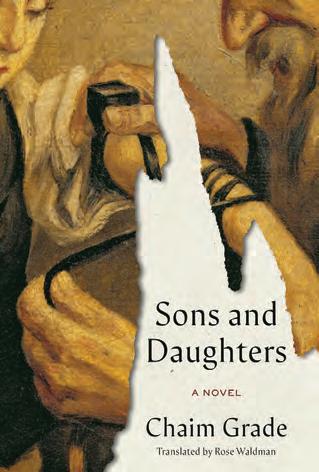

Headlines
Minneapolis Catholic school shooter’s weapons were allegedly marked with antisemitic messages
The shooter who killed children attending a Catholic mass at their school in Minneapolis last week allegedly used a gun that featured antisemitic and anti-Israel writing, as well as the name of the Pittsburgh synagogue shooter, JTA reported.
The alleged shooter, Robin Westman, 23, approached the side of Annunciation Catholic School and shot at the children sitting in the pews, killing two children aged 8 and 10 and injuring 17 other people, including 14 children. Westman then died of a self-inflicted gunshot wound outside of the school.
According to the Anti-Defamation League’s Center on Extremism, writing on the guns used in the attack featured “antisemitic and antiIsrael references; praise for mass killers across the ideological spectrum, including white supremacist, anti-Muslim and antigovernment extremists; as well as other school shooters.”
A YouTube account believed to have belonged to Westman shared videos prior to the shooting in which gun parts and smoke grenades can be seen with neo-Nazi messaging including, “6 million wasn’t enough,” “Burn Israel,” “Israel must fall” and “Destroy HIAS,” a reference to the Jewish humanitarian organization. The videos were removed after the shooting.
HIAS was also targeted in online writing by the Pittsburgh synagogue shooter.
Beverly Hills school board narrowly votes to fly Israeli flags in effort to combat antisemitism
The Beverly Hills Unified School District will display the Israeli flag in all of its facilities during Jewish Heritage Month starting next year, in an unusual move that split the school board in the ritzy and heavily Jewish enclave within Los Angeles, JTA reported.
School board president Rachelle Marcus voted against the resolution, citing fears that the flag could cause schools to become targets.
Another board member, Amanda Stern, also voted no, arguing that “partisan material,” including national flags, is not appropriate in public school resolutions. “I love Israel, but I don’t think it belongs here,” she said, according to the Los Angeles Times.
But three board members voted yes on the resolution, which included other measures meant to combat antisemitism in local schools.
“This is a time right now that Jews are being killed and slaughtered on the street, and threats are happening,” said one of them, Sigalie Sabag, according to CBS News.
In addition to displaying the flag in its schools, the resolution also compels Beverly Hills to begin commemorating Holocaust Remembrance Day, designate Oct. 7 as a “Day of Remembrance,” train educators to respond to antisemitism and adopt the International Holocaust Remembrance Alliance definition of antisemitism. The definition has drawn challenges because it characterizes some forms of Israel criticism as antisemitic.
The resolution comes as California has faced heightened scrutiny over antisemitism in public
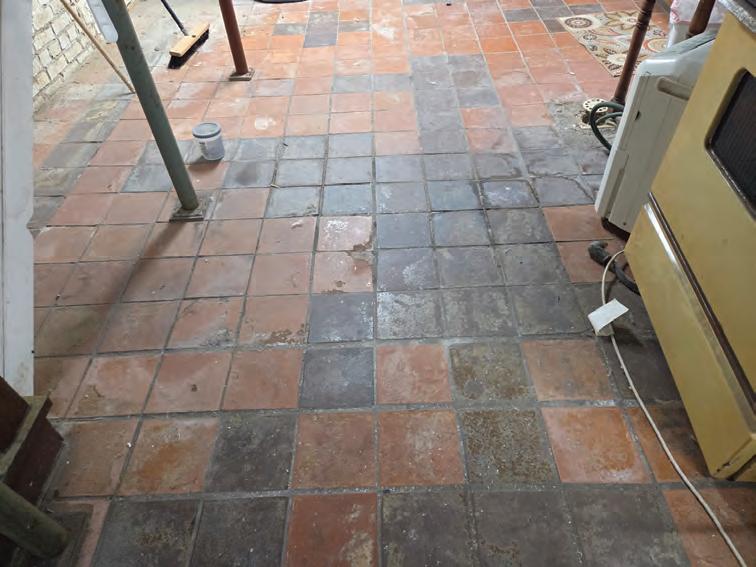
Continued from page 3
symbols constituted a material defect that the former homeowner had a duty to disclose.
Wentworth and her husband hired attorney Daniel Stoner, who sued for the cost of replacing the floor.
Stoner said that the former owner and his attorney, Albert Torrence, asserted that the swastika is an ancient symbol used by many cultures throughout the world and that it wasn’t a material defect.
In a letter to Stoner, Torrence said that Wentworth had full access to the home before buying it and while the symbols were covered, the rug wasn’t affixed to the floor and could have been moved at any time.
schools. Many of the challenges have centered around an ethnic studies requirement, recently suspended, that critics said opened the door to antisemitic and anti-Israel instruction.
Half of US voters think Israel is committing ‘genocide’ in Gaza, per Quinnipiac poll
Half of U.S. voters say the Jewish state is committing “genocide” in Gaza, according to a poll released last week, which at the same time shows that American sympathies are now divided between Israelis and Palestinians, JNS reported.
In the Quinnipiac University poll, 50% of registered voters said that Israel is committing genocide, while 35% disagreed. The remaining 15% had no opinion.
Voters were evenly divided when asked where their sympathies lie during the current conflict that erupted after Hamas attacked Israel on Oct. 7, 2023. In the poll, 37% said the Palestinians and 36% named Israelis. The other 27% had no opinion.
Some 60% of voters opposed sending more U.S. military aid to Israel, while 32% supported it — the lowest level of support and highest level of opposition in Quinnipiac polls since the war began nearly two years ago.
Pulitzer Prize-winner Geraldine Brooks awarded Library of Congress American fiction award
The Library of Congress has awarded Geraldine Brooks, a Jewish author whose best-selling novels are often inspired by Jewish history, its prestigious 2025 Prize for
American Fiction, JTA reported.
Brooks, a former foreign correspondent for the Wall Street Journal, won the Pulitzer Prize for fiction for her novel “March,” which reimagines “Little Women” from the father’s perspective, in 2006.
Her bestselling novels also often focus on aspects of Jewish history, including “People of the Book,” which chronicles the preservation of the famed Sarajevo Haggadah, and “The Secret Chord,” which explores the life of King David. Brooks married Anthony Horowitz, a Jewish author and journalist, in 1984 and converted to Judaism. At the Library of Congress National Book Festival on Sept. 6., she will discuss her latest book, “Memorial Days,” a memoir about the sudden death of her husband in 2019.
“I am honored by this wonderful prize from America’s greatest library,” Brooks said in a statement. “As a writer inspired by history, it is moving to be connected by the Library of Congress Prize for American Fiction to the institution created by John Adams for the very first Congress, saved by Thomas Jefferson after the conflagration of 1812, and carried into the present by visionary librarians who value inclusion, free expression and truth.”
Last year’s winner of the American fiction award was James McBride, who also has infused his Jewish background into his books, including his most recent novel “The Heaven & Earth Grocery Store.” Previous Jewish winners include E.L. Doctorow, Philip Roth and the prize’s first honoree, “Marjorie Morningstar” author Herman Wouk. PJC
— Compiled by Toby Tabachnick
Today in Israeli History
Sept. 8, 2010 — Tank designer
Tal dies
Former Israeli armor commander Maj. Gen. Israel Tal, best known for leading the committee that designed and developed the Merkava (Chariot) tank in 1970, dies at 85.
A judge agreed with Torrence and ruled against the couple, who are appealing the decision.
Wentworth believes the symbols negatively impact the value of her home and those of her neighbors.
In addition to having the symbols removed, Wentworth thinks there should be laws created to force a homeowner to disclose when there is a hate symbol inside a home they are selling.
“I don’t want anyone to have to go through this again,” she said. “Nobody wants a swastika in their home.”
The Chronicle was unable to reach Torrence before press time. PJC
David Rullo can be reached at drullo@ pittsburghjewishchronicle.org.
Sept. 5, 1972 — 11 Olympians are killed in Munich
Black September terrorists kill two Israeli team members and take nine others hostage at the Summer Olympics in Munich. All nine hostages, as well as five of the eight terrorists, are killed in a German rescue attempt.
Sept. 6, 1840 — 9 Jews are freed after Damascus blood libel
Under international pressure, Ottoman Pasha Muhammad Ali frees the nine surviving Damascus Jews of 13 who were falsely accused of killing a Franciscan Capuchin friar and his servant for their blood.

p A Moritz Daniel Oppenheim painting depicts a rabbi preparing his defense during the 1840 Damascus Affair.
Sept. 7, 1907 — Ben-Gurion arrives in Jaffa
Three years before changing his last name to Ben-Gurion, David Gruen arrives in Jaffa with his girlfriend, Rachel Nelkin, and other Poalei Zion members from Plonsk, Poland. He settles in Petah Tikvah.
Sept. 9, 1948 — Cinema director
Alon Garbuz is born
Alon Garbuz, the director of the Tel Aviv Cinematheque for four decades, is born in Givatayim. Under his leadership, the cinematheque establishes a permanent home and becomes Israel’s top film society.
Sept. 10, 1956 — Archaeologist
Eilat Mazar is born
Eilat Mazar, a third-generation archaeologist, is born. Her best-known work involves excavations in Jerusalem’s City of David, including remnants of what she believes to be King David’s palace.
Sept. 11, 1881 — Literary pioneer
Yosef Haim Brenner is born
Yosef Haim Brenner is born in Ukraine. He publishes his first story collection in Hebrew in 1900. As an essayist, a novelist and a poet, he experiments with techniques such as blending languages. He is killed in Arab riots in 1921. PJC
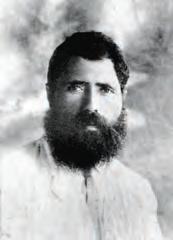
p Arab rioting in Jaffa in 1921 cut short Yosef
Items are provided by the Center for Israel Education (israeled.org), where you can find more details.
p A Reichsadler eagle was located not far from a swastika tiled in Lynn Rae Wentworth’s home.
Photo by David Rullo
Haim Brenner’s acclaimed literary career Central Zionist Archives
Swastika:
Estate Planning

Questions about estate planning
People have many questions about estate planning, typically about last wills and testaments, powers of attorney and living wills. These questions usually cause them to put off planning. However, it is better to put an estate plan in place than it is to pass away without a last will and testament or to become incapacitated and not have powers of attorney. Below are some of the main questions that serve as barriers along with their answers.
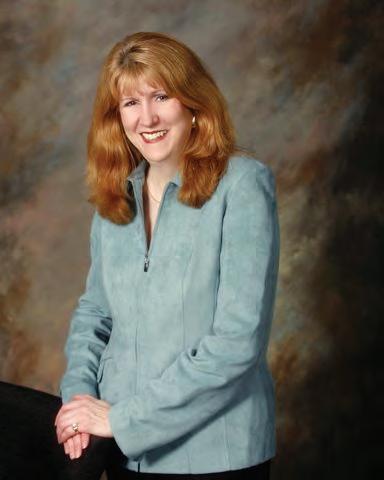
Q: When is the best time to start working on my estate planning?
A: Now! Most people start right before they go on vacation or if they are about to have surgery. While it is possible to put an estate plan in place quickly, it is a better idea to take time to consider the details involved.
Q: What questions or details should I be considering?
A: It is important to determine who your beneficiaries are — those to whom you want to leave your assets. Do you want to set up specific bequests for individuals or
contingent beneficiaries, executors, agents and guardians? These are all decisions you get to make as opposed to leaving the choices up to state law.
Q: What should I consider when choosing an executor?
A: Some people are not sure who to name as the executor of the last will and testament since this person will have to handle the important job of administering their estate. It may be an honor to be named as an executor, but it is also a responsibility. The executor has to collect and liquidate the deceased’s assets, clean
eventually having a judge decide who will handle financial matters (guardian of the estate) and medical matters (guardian of the person) for the incapacitated person. The person appointed by the judge may not be the person that the individual would have selected.
Q: I already have an estate plan. Does it need to be reviewed?
Q: Who should have an estate plan?
A: Anyone who is over the age of 18 can prepare an estate plan. Powers of attorney are usually recommended for those going off to college or joining the military so that these young adults can appoint an agent to make medical or financial decisions if they become incapacitated. As for the preparation of a last will and testament, it is best for anyone who has assets in their own name, those who were just married or who had or adopted a child, or those who recently lost a loved one.




charities? Consider if assets should be left outright to the beneficiaries or in some type of trust because the beneficiaries are minors, have special needs or are just not good at handling money. Decide who should be named as the executor of the will or the agent under a financial or medical power of attorney. Consider who to name as the guardian for minor children — a family member or a friend. Does the will name












out their residence, pay their bills, pay Pennsylvania inheritance taxes, pay income taxes and eventually distribute what remains after everything is paid to their beneficiaries. The executor has to comply with Pennsylvania law when it comes to administering the estate and should usually work with an attorney to be sure that the law is followed.
Q: What other documents make up an estate plan besides a last will and testament?
A: If one can no longer make financial or healthcare decisions for themself, it is helpful to decide now who would help with these important matters. Financial powers of attorney can designate someone to help manage financial matters, and healthcare powers of attorney can designate someone to help make medical decisions. Advance healthcare directives, or living wills, can designate someone to help make end-oflife decisions. Without these important estate planning documents, these decisions may be left up to family members or even a judge if guardianship is needed. Guardianships involve filing petitions with the Orphans’ Court, getting medical evidence, participating in hearings and
A: Estate planning is not something people should do once and consider it done. There are many situations and circumstances that require changes to an estate plan. Changes in one’s personal life can require estate planning changes, such as the birth or adoption of a new child or grandchild, marriage or divorce of the person who made the estate plan or of one of their family members and the death of anyone who was previously named as a beneficiary or executor. Another situation that is outside of anything an individual can control is a change in the tax law. Many estate planning tools may be chosen specifically for their tax advantages, but a single change to the laws in this area may have major implications. Changes in one’s assets or debts are also things that require a fresh look at an estate plan, which could include the purchase or sale of a home or a dramatic increase or decline in the value of investments. Another reason to update an estate plan is if one moves to another state. It is important to have estate documents that comply with the new state’s law and would be familiar to local banks or medical providers.
In conclusion, do not wait to create an estate plan because no one knows what the future may hold. Preparing an estate plan or revising an old estate plan can help to protect you, your loved ones and your wishes.
PJC
Carol Sikov Gross, Esq., CELA (Certified Elder Law Attorney by the National Elder Law Foundation as authorized by the Supreme Court of Pennsylvania) is managing partner of Sikov and Love, P.A. She can be reached at csikovgross@sikovandlove.com.
Guest Columnist
Carol Sikov Gross
Estate Planning
Amid volatility, Americans are living financially fulfilled lives
By StatePoint Media
Three quarters of Americans (74%) are optimistic about their financial futures despite recent market volatility and uncertainty, according to new research.
Capturing the goals, challenges and feelings of North Americans regarding their finances, research for “The Pulse of North America” report was conducted by Edward Jones and Cerulli Associates during April’s increased market volatility. An encouraging 79% of respondents indicated they are on track to achieve or have already achieved a financially fulfilled life.
“Sentiment from our own clients confirms this,” said David Gunn, principal, head of U.S. and Canada Business Units at Edward Jones. “In the half a million conversations our financial advisors have had with clients in the past five months, only a quarter of our clients highlight financial stress. This reflects the power of deep, personal, trusting relationships and holistic financial advice.”
Recent volatility impacts, but does not derail, financial fulfillment
Despite 49% of respondents indicating that inflation is a source of financial stress, Americans remain steadfast in the pursuit of financial fulfillment. They define fulfillment as having the freedom to pursue their passions (46%), make a better life for themselves and their families (42%), and have security and protection from
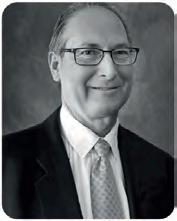

unforeseen events (41%).
To become more financially fulfilled, Americans are most willing to change their discretionary spending habits (45%), pay off their debt (33%), and improve their financial literacy (28%). This flexibility will help them tackle potential obstacles, including rising living costs (59%), unexpected financial setbacks (35%), and insufficient income or savings (27%). Nearly two-thirds of respondents (63%) indicated they would need to earn a $150,000-plus salary annually to achieve financial freedom.

Americans report optimism and progress relative to personal benchmarks
When it comes to tracking financial progress, only 18% of Americans benchmark themselves against their own goals and plans rather than those of others, while 33% primarily compare themselves to their peers, 22% to their significant others, and 19% to their colleagues.
Respondents indicated that they are tracking confidently against financial and
other life goals, reporting that they are on par with or ahead of others when it comes to specific objectives, such as achieving financial stability (88%), travel goals (84%), financial literacy (83%), saving for retirement (80%), and achieving homeownership (78%).
“Even with heightened market volatility and economic uncertainty, American investors have stayed the course with their portfolios and long-term plans,” added Gunn. “They are making meaningful progress by keeping the future in mind, while expressing willingness to pivot in real time with the help of a financial professional.”
The role of financial advisers in pursuing financial fulfilment
While 57% of DIY investors have a financial plan, this number increases to 77% for Americans who regularly engage with a financial adviser.
Those working with a financial advisor are doing so to manage financial risk (28%), seek a second opinion on financial decisions (26%), or based on recommendations from family members or other professionals (25%). Americans who regularly work with a financial advisor are more likely to feel optimistic about their financial future than those who manage their finances on their own (79% vs 71% respectively). PJC
For more research insights, visit www. edwardjones.com/pulse.
ABERNETHY & HAGERMAN ELDER LAW
NOTE: NEW SQUIRREL HILL OFFICE LOCATION TO BE ANNOUNCED SOON!
Is a Trust Right for You?
You don’t need to be wealthy to use a trust. A trust covers a wide range of purposes, but at its core, it always functions as a three-way arrangement or relationship. The trust creator establishes the trust, a trustee manages it (either the creator or someone else), and one or more beneficiaries receive the benefits in whole or in part.
At its most basic, a trust helps someone receive or manage an inheritance or gift. A common example is a testamentary trust in a Last Will and Testament. This sort of trust is often created to benefit minor children, young adults, or individuals with special needs, who require help managing money.
Understanding Trust Options
You can also create a trust during your lifetime. A revocable trust, for example, takes effect immediately. In this case, you may serve in all three roles: trust creator, trustee, and beneficiary.
The advantage of a revocable trust is that it avoids probate. Probate is not a nightmare, but it does involve extra paperwork and court oversight. The disadvantage is that establishing the trust requires an investment of time, energy, and money now in exchange for efficiency later. However, a revocable trust cannot protect assets from the high costs of a future long-term care event. Because it is revocable, Medicaid counts the assets as still available to you.


The Power of an Irrevocable Asset Protection Trust
An Irrevocable Asset Protection Trust solves this problem. With this type of trust, you transfer some of your assets (not all) into the trust and give up the right to directly access or use the principal. You may still receive the income the trust produces, but you cannot withdraw from the principal itself. The trust is permanent and irrevocable, although in practice it allows some limited flexibility and exceptions. You also cannot serve as the beneficiary of the principal. It is like making a gift to your children or loved ones, except that the terms of the trust can control how and when they receive or use it.
For this protection to be effective, you must wait through Medicaid’s five-year look-back period before applying for Medicaid benefits. That is why starting sooner rather than later is critical. Once the five-year period has passed, if you need nursing home care and Medicaid assistance, the funds in the trust remain safe. Medicaid does not require you to spend them down first, because you gave them away more than five years earlier. The trust also avoids probate, helps shield assets from certain other creditors and risks, and preserves valuable income tax benefits such as a step-up in basis.
The disadvantages are also important to note. You must give up a significant degree of control over the funds, and you face the upfront cost of setting up the trust: in time, energy, and money. It is also not wise to put all your money into the trust. You should keep some funds liquid for immediate needs and flexibility. Ideally, you contribute enough to cover your potential care costs above your income for the next five years, though this is often a planning estimate rather than an exact science.


Planning with Con dence
There is no minimum wealth requirement to use an Irrevocable Asset Protection Trust. What matters is whether you can set aside “extra” money as a future gift. This type of trust can be a good fit if you are relatively young and healthy, or if you already have longterm care insurance as part of your planning.
It may not be the best fit if most of your wealth is tied up in qualified retirement accounts. You cannot move retirement funds directly into your own trust during your lifetime without liquidating them and paying tax. This often outweighs the benefit. Irrevocable trusts aren’t a “one-size-fits-all” solution. They require careful planning, an understanding of the trade-offs, and professional guidance to ensure they’re designed correctly and aligned with your goals.

If protecting your legacy and gaining peace of mind are priorities, now is the time to explore whether an Irrevocable Asset Protection Trust is right for you. Contact our office today to learn how we can help safeguard your assets and provide for your loved ones well into the future.
Stay tuned for the announcement of our new Squirrel Hill office location!
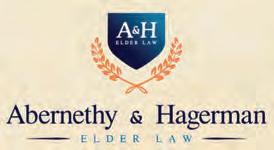

marks@marks-law.com • mhm@a-h.law 4927 William Flinn Highway Allison Park, Pennsylvania 15101


Photo by Carlos Pascual via iStock

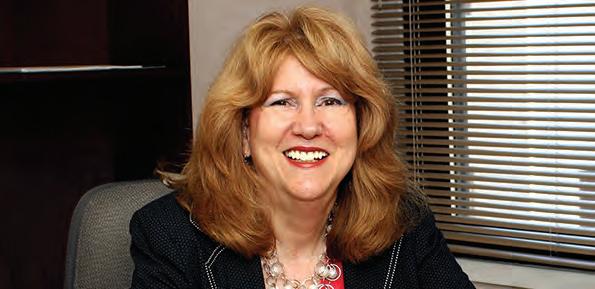


•
•
•
•



Headlines
Fingerhut:
Continued from page 1
of the war, and the terrible trauma that has occurred as a result. Everybody knew about the devastation of the south, but now we’re more aware of the problems in the north that have resulted from Hezbollah’s attacks and, of course, the miluim who’ve been serving for so many days and months. The collective response of the Federation system has been extraordinary. We raised over $900 million and got that money to where it needed to be deployed quickly — and I think with real efficiency, but also integrity. There really isn’t a sector of Israeli society or a part of the country that wasn’t touched in a positive way by the North American Jewish community through the efforts of the Federation emergency campaign. That is something that we’re enormously proud of.
And then we ask ourselves, “What does the future look like?” And even though we can’t say that the war is over — and the emergency, therefore, isn’t fully over yet — we’ve begun some serious planning for what comes after the war, which God willing will come soon, and we call it “Rebuild Israel.”
There’s really two components of it. One is to encourage all of the interactions that the Federations have in Israel to make long-term plans. We have many partnership communities, for example, and those Federations are making multiyear commitments to those communities. We adopted new kibbutzim during the course of the last two years, making long-term commitments — now, multiyear commitments — to them.
We’ve asked ourselves, “What are some of the big topics that that need collective action and support in Israel?” One is the whole issue of
Rosh Hashanah:
Continued from page 1
and son studying Torah together, she continued. The two begin arguing and the debate intensifies. As the rhetoric escalates, the father and son make a decision. In lieu of further contesting each other’s points, they pause and choose to “not push a relationship into a space where they don’t want it to go.”
Learning Torah is a “crucial mitzvah,” but even in that moment the father and son recognize a greater need, Finman, the JCC’s senior director of Jewish life, said. “Sometimes, in relationships, you just need to pause — and it doesn’t mean we’re not coming back to it, it just means, ‘Hey, we need to breathe, to calm down, to not be distressed, and then we could be back in relationship with each other.’”
Seeking peace with others is a common practice during Elul. Reaching personal tranquility is another.
In preparation for Rosh Hashanah, Cantor Julie Newman has been leading Elul Yoga. Held on Fridays at Rodef Shalom Congregation and Sundays at Congregation Beth Shalom, the four-week program focuses on movement, breath and reflection.
Many Jews undertake a cheshbon hanefesh (spiritual accounting) before the holiday. The Hebrew word nefesh, Newman said, is often translated as “soul,” but according to Jewish mysticism it actually refers to the
trauma. This is a country that has experienced such broad-based trauma, and needs support for resilience, and of course, some portion needs serious mental health and medical attention, which the hospitals and the medical system in Israel will provide, but we can help. Finally, there’s an issue of rebuilding that is really both to help Israel, but also to help our own communities reconnect. We’re partnering together with Birthright to build a really broad-based volunteerism in Israel program to reach all ages and all communities in North America, so people can go and not only give of their financial resources, but also give of their time and commitment. Those are some things that are already underway, but we expect there’ll be more now.
A second important area for our future response is obviously here at home. We’re enormously proud of the successful unified support of the Jewish community across America since Oct. 7, for the physical security of American Jews, for the political support of America, for Israel. But we know that this last couple months have been very, very challenging, and are straining all of this success to the breaking point, both on physical security and on the antisemitism that is arising as a result of antiIsrael activity that has been unleashed. So our focus has to be on how do we also rebuild that at home, and making sure our community is connected in a positive way to Israel — the volunteer programs, but also just doubling down on the things we do, educating our kids, sending them to Israel, Jewish summer camps, Jewish day schools, all the Hillels, Chabads on Campus, all of the really important things to engage even more of our community, but also the relationships outside of our Jewish community.
Here in Pittsburgh, you know that you must
be engaged in the broader community at a much higher level than in recent years — what we sort of lump under “community relations,” but it’s really about making sure that the civic institutions of our community on which we depend — city councils and city halls and police departments and school boards and chambers of commerce — are aware of this rising problem of antisemitism, that they understand why this is a threat to the Jewish community and to the Pittsburgh community as a whole. Because if it takes over the community, it damages the entire community, not just the Jewish community, and they have an important role to play in keeping out these negative influences and ideas.
The world saw how much support Pittsburgh got from the wider community after the horrific antisemitic attack here on Oct. 27, 2018. We have not seen that kind of support since Oct. 7. It seems like the tide has gone the other way. What do you make of that? I think this is one of the major challenges and responsibilities we face. The mostly positive response from the community right after Oct. 7 has significantly eroded, and we know there’s a global campaign to do just that. And they have deep roots in every community — and they have roots here in Pittsburgh. We have to be operating at a different level. The physical security protections we put in place are necessary but are not sufficient. We have to have an aggressive, well resourced, coordinated effort to make sure that every level of this community is aware that what they’re saying or what they’re doing or what they’re hearing is isolating and marginalizing and threatening their Jewish community. We have

lowest, most base, animalistic and physical element of the soul.
“Yoga can be a part of that,” Newman said. “It’s about returning to who we are, checking in with who we are and who we are meant to be.”
Newman is president of the Tiferet Project, a local group offering “mindful spiritual practices grounded in Jewish wisdom.”
Twice a week participants gather for yoga and what Newman described as a “calendar-based” Jewish practice.
to be the ones that are out there expressing that and building and maintaining permanent relationships. Most of us have some relationships in the broader community — through business, through our families, through other ways — and we can’t stay inside of our community. We have to build these external communications and advocacy. This is what the central function of community relations in this coming period of years is: to protect the Jewish community and to do that by making sure that the leaders of the broader civil society in which we live understand this issue, know what the expectations are, and live up to those expectations.
Are you optimistic about the Jewish future?
One hundred percent. First of all, the extraordinary accomplishments of the Jewish community in North America since Oct. 7 — the response to support Israel, the response in our own communities — has been extraordinary, and that’s because of the work we’ve been doing all these years. Despite the terrible messaging that our young people are getting, well over half of our young people understand, and they support Israel.
We know that Jewish identity and identification, education and engagement with the Jewish community strengthens and builds the Jewish future. You have so many great examples of that here in Pittsburgh and we’re going to invest in that growth, and we’re going to see the dividends of it. So I’m very optimistic. In the coming year, we’ll see our hostages come home, God willing. We’ll see the war end, and we’ll be able to then focus on those positive investments that need to be made. PJC
Toby Tabachnick can be reached at ttabachnick@pittsburghjewishchronicle.org.
a space for teens inside the Squirrel Hill JCC, a Sept. 18 meeting of the volunteerism club will feature brisket, desserts and an opportunity to set new year’s goals as a lead-up to Rosh Hashanah.
Throughout the community, programs and exercises encourage people to approach the High Holidays with thought and care. But the seriousness of the period doesn’t mean fun can’t be had.
At a barbecue during Elul, which allowed faculty and parents of Yeshiva Schools of Pittsburgh to break from a week of back-toschool preparations, one attendee delivered a seasonal sound.
Standing beneath a shelter at Schenley Park, he blew the shofar, Rabbi Yossi Rosenblum, Yeshiva’s CEO and head of school, said.
“This is whole body Judaism. It’s not just head; it’s head, heart, body,” she said. It’s something “that we are not just thinking about — it’s not just from the neck up — it’s about bringing your body into the process.”
Practicing cobra, child or mountain poses may prove challenging for some. In that case, other pre-Rosh Hashanah undertakings are occurring nearby. At Congregation Poale Zedeck, a Wednesday evening program encourages women to study holiday-related material with a partner. At The Second Floor,
Sounding the ram’s horn is a wake-up call that Rosh Hashanah is rapidly approaching. For some, hearing its blast will spur thoughts about one’s relationship with the divine, Finman said.
Right now, the spiritual leader’s thoughts are elsewhere.
She said that after hearing the shofar at the conclusion of the Rosh Chodesh program, she’s thinking about relationships between people.
With Rosh Hashanah arriving shortly, she said, “We better shape up or ship out.” PJC
Adam Reinherz can be reached at areinherz@pittsburghjewishchronicle.org.
p Cantor Julie Newman, left, and Edie Raphael, engage in yoga.
Photo by Talia Dubowitz courtesy of Cantor Julie Newman
community, confronting challenges and building a Jewish future
Guest Columnist
David Heyman One year in: Strengthening
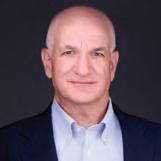
This September marks one year since I began serving as associate vice president of marketing at the Jewish Federation of Greater Pittsburgh. It has been a year of pride, purpose and connection, a year in which I’ve seen up close the strength and resilience of this remarkable Jewish community.
I’m not a native Pittsburgher, but I married one. Over the years, I’ve heard my wife’s stories of growing up in Squirrel Hill: Linden Elementary, Allderdice High School, confirmation at Tree of Life, heading “up street” and dressing up to go “dahntahn.” We were married here (at what was the Hyatt near the old Civic Arena site). We moved to Shadyside in 2021, and now we proudly call Pittsburgh home.
Over the past year, I’ve seen how this community shows up for one another in times of both joy and challenge. We came
together in solemn reflection for the Oct. 7 commemoration and Yom HaZikaron. We celebrated the joy and resilience of Israel on Yom Ha’atzmaut. We stood shoulder to shoulder with our LGBTQ+ friends and family at the Pittsburgh Pride parade, affirming that inclusion and Jewish values go hand in hand.
traffic court judge fine the disseminator of antisemitic flyers almost $50,000 — for littering. These moments underscored for me the seriousness and importance of Jewish communal work.
Time and again, I’ve seen how people here respond quickly and publicly to challenges. Equally powerful is what happens behind
Over the past year, I’ve seen how this community shows up for one another in times of both joy and challenge.
Some of the most powerful moments for me have been being “in the room where it happens.” I was in the courtroom when Not On Our Dime admitted it had failed to gather enough valid signatures, the culmination of months of work by multiple organizations to stop a misguided referendum rooted in division and misinformation about Israel. I watched as Talya Lubit pleaded guilty to defacing religious property, a sobering reminder of the challenges we face. And I saw a
the scenes: neighbors supporting neighbors, security professionals working together with synagogues and schools, and volunteers stepping up to make Jewish life in Pittsburgh safe, welcoming and vibrant.
I’ve also seen how Pittsburgh’s Jewish community invests in the future. Our day schools, the Jewish Community Center of Greater Pittsburgh, JFCS, Hillel JUC, The Branch and the Jewish Association on Aging are not just organizations, they are lifelines. They educate, support and connect.
They nurture Jewish identity, care for the vulnerable and inspire the next generation of leaders. Together, they form the backbone of a community that is deeply rooted and forward-looking.
This is a pivotal moment for the Jewish people, locally, nationally and globally. The challenges are real, but so is our resolve. What has struck me most over the past year is not just how Pittsburgh Jews react to crisis, but how we build every day toward a stronger future through learning, celebrating, serving and showing up for each other.
As I look back on my first year, I feel deep gratitude for the chance to serve and to learn from this community’s resilience. The Pittsburgh Jewish community has welcomed and inspired me. I’m honored to give back to a city and a people that mean so much to my family. And as I look ahead to Year 2, I’m excited to keep listening, keep learning and keep working alongside all of you to build the Jewish future we want to see. PJC
David Heyman is associate vice president of marketing at the Jewish Federation of Greater Pittsburgh.
Thinking about divine inspiration
Guest Columnist
Tim Miller
When we talk about the Bible being divinely inspired, what do we mean? The Baroque painter Caravaggio put it one way. When he was commissioned to paint the Christian Saint Matthew composing his eponymous gospel with an angel at his shoulder, Caravaggio knew that making an unambiguous image of such a moment was ill-advised, so he had fun with it. Matthew looks more bewildered than enthralled by the divine and, as one writer memorably put it, the resulting painting shows “a puzzled barefoot peasant taking an adult literacy lesson from God’s smirking pubescent messenger.”

with the inspiration of God took centuries to develop. Once it took hold in (give or take) the early centuries CE, the rabbis expanded on the Torah’s history, since if its origin was divine it must have existed in heaven first. Indeed, the Talmud mentions that this heavenly Torah was written “in black fire on white fire, resting on the knees of the Holy and Blessed One.” Ever since the time of Ibn Ezra (1089-1164), many of our greatest
source. Speaking of the Tanakh as a whole, the idea that a tiny and largely insignificant people in the ancient world, after being defeated and experiencing exile, should gather their scattered traditions of narrative, poetry and prophecy into a book; and that this book only found its current form after centuries of compilation and redacting by many hands; and that this book — not to mention the people it serves — should have
novel — which includes a Jew whose faith crumbles after reading Nietzsche — began to feel dated very quickly, while the Torah somehow remained, as ever, new. And the most obvious thought came to mind: We are only Jews at all because of the Torah.
It was striking to hear about the philosopher Hannah Arendt’s work after World War II with an organization that sought to preserve Jewish property found in Americanoccupied Germany, among which were hundreds of Torah scrolls. Whatever Arendt made of the Torah’s origins and meaning, she could not abandon these scrolls. And it is only because of the Torah that we’ve heard our neighbors say things like, “I am not religious at all, but I want my children and their children to be raised Jewish.”
What’s most interesting for Jews in this painting is that the angel is trying very hard to teach Matthew how to write Hebrew. The larger question is what exactly “divine inspiration” is supposed to be. What does our tradition mean when it says that God dictated the Torah to Moses, when using the word “dictated” makes it sound like the task took place in a cubicle? As Rav Kook said about the dangers of talking too much about God, “every definition is spiritual idolatry… even the term divine, the term God, suffers from the limitations of definition.”
The idea of Moses writing the entire Torah
commentators have pointed out numerous passages in the Torah that Moses could not have written himself, and this chipping away has continued. Over the past two centuries at least, the historicity of Moses in particular (and the Exodus more generally) has been questioned, leaving the idea of divine inspiration in the hands of the most devout.
This is a shame, first of all, since the concept of divine inspiration seems to be more fruitful as poetry and mysticism, than as an excuse to impose authority. Secondly, I’ve never understood how the literary or archeological study of the Hebrew Bible can truly take away from its possible divine
outlasted every empire, then and now, in part because of the myriad ways in which it was read and interpreted, told and retold; and that this book still rewards study and investigation … this entire process seems very nearly divine to me, as much as anything written “in black fire on white fire.”
Put another way: I spent the last month or so listening to the late Chaim Grade’s posthumously published novel, “Sons and Daughters.” As good as it is, I was struck every time I took a break from the book to read the weekly parashah, and was perhaps not surprised to find that the Torah remained more compelling. Grade’s
Whatever we make of the Torah and its origins, there is something about its persistence that goes beyond a compulsion to merely carry on a tradition. I don’t mind calling that “something” divine, even though I also can’t describe it in any more detail than that. But what it means is that long after Netflix and Donald Trump’s tweets and another dismal Pirates season have become dust, the Torah will still be sitting right there, waiting. It is like the stranger that Jacob encounters on the other side of the Jabbok river: If we continue to call ourselves Jews, the Torah will remain, and we might as well wrestle with it. PJC
Tim Miller is a poet and writer living in Pittsburgh. He is online at wordandsilence.com.
Chronicle poll results: Western allies’ recognition of a Palestinian state
Last week, the Chronicle asked its readers in an online poll the following question: “Should Western allies like the United Kingdom, France and Canada recognize a Palestinian state if there is no negotiated agreement with Israel?” Of the 319 people who responded, 76% said no; 17% said yes; and 7% said they weren’t sure. Comments were submitted by 90 people. A few follow.
Rewarding terrorism is a horrific idea.
What does it mean to recognize a state without established boundaries and when they haven’t had an election in 20 years? What’s being recognized?
A viable Palestinian state cannot exist without recognition of Israel, especially if they hope to use any of Israel’s infrastructure.
Israel is never going to negotiate an agreement with Palestine. It is expanding settlements, which will bifurcate the West Bank; ignores settler violence; and is occupying all of Gaza with the expressed goal that they be sent to neighboring nations. This
Should Western allies like the United Kingdom, France and Canada recognize a Palestinian state if there is no negotiated agreement with Israel?
I think someone needs a PhD in Middle East relations to have an opinion about this complicated subject.
Europe is rewarding terrorism and Jew hate. Their recognition is one-sided and should include the conditions of returning the hostages, stopping the teaching of Jew hate, recognizing Israel as a Jewish state and committing to peaceful coexistence.
For the folks who say “yes,” clearly we have learned nothing from the past, which is a very scary world to live in.
solution as a beginning, those other roads of peace and coexistence will not take root.
Israel and the Palestinians need to communicate. Outside countries cannot — and should not — make decisions for them.
Recognizing a Palestinian state now merely justifies Hamas’ Oct, 7 terrorist acts and encourages future such acts.
Since Israel refuses to make an agreement and compromise with the Palestinians, some pressure has to be applied.
is a peaceful form of pressure on Israel to end a system that is unsafe, unsustainable and unethical.
Future looks bright for new combined religious school
While the merger of Temple Sinai and Rodef Shalom Congregation will leave behind some traditions, the new congregation faces an exciting future.
For me, a former 45-year teacher at Temple Sinai, the most exciting aspect is the combining of the religious schools, which will once again put Rabbi Larry Freedman in charge. I had the extreme privilege of working with Rabbi Freedman during his 10-year tenure as Temple Sinai’s assistant rabbi and educational director. His guidance and leadership made our religious school program the envy of congregations from New York to Chicago. Rabbi Freedman’s program was filled with innovation, creativity and fun. He also excelled at teaching the teachers. Our students were excited to attend and our teachers were excited to teach.
I believe that things are bashert and it was bashert that Rabbi Freedman decided to return to Pittsburgh to educate future generations of our students. The future is looking bright.
Harold Marcus Bala Cynwyd, Pennsylvania
Israelis say stop the war
Massive protests have seized Israel, as hundreds of thousands of Israelis gather to call for an end to the war (“ ‘We want them back’: Israelis strike and protest in call for hostage deal, end of war,” online Aug. 17).
The Hostages and Missing Families Forum, which represents relatives of some of the captives, said on Aug. 24 that more than 400,000 people joined the protest in and around a Tel Aviv plaza known as Hostages Square; 400,000 out of about 7 million Jews in Israel is the equivalent to approximately 20 million in the U.S.
It’s increasingly clear that Netanyahu and his cabinet — far-right, corrupt — do not represent the will of Israelis. Netanyahu is only extending the war to avoid his trial for corruption. After Oct. 7, the Pittsburgh Jewish Federation distributed signs that said, “We Stand with Israel.” As American Jews, we need to sharpen that message. We shouldn’t support the Netanyahu government and its endless war.
Instead, we should listen to the people of Israel — as well as 19 former Israeli security chiefs — who say that the time has come to end the war (“Ending the war is a moral and
Centuries of hatred continue to fuel tragedies for all. Respect of life, respect of differences, acceptance of human rights is critical to peace. Must we covet control, power, the ability to determine the way of life of others? Lasting peace seems doubtful given history, but we need to seek peace for our children, families, cultures and civilization to survive. A two-state solution is not a perfect answer, it merely sets borders and governments. Yet without that
How many times does the state of Israel have to keep giving in? There will never be peace until Israel is recognized as a state. The most important aspect of peace is releasing the hostages. PJC
— Compiled by Toby
Tabachnick
Chronicle weekly poll question: Should Pittsburgh be a “sanctuary city”? Go to pittsburghjewishchronicle.org to respond. PJC
strategic imperative,” Aug. 20).
The protest on Aug. 24 was called by the October Council, which is made up of family members of hostages and those killed on Oct. 7 and survivors of the attack. They called for the protest after Netanyahu’s cabinet voted earlier last month to conquer Gaza City despite warnings by the IDF that it would endanger the hostages.
The October Council and other Israelis protesting represent the voice of wisdom and the voice of the people. In July, 74% of Israelis backed an agreement to release hostages and end the war. The Times of Israel reported that only 8% backed Netanyahu’s approach.
Let’s amplify the voices of the Israelis on the streets. For Israel, for our religion, for people starving in Gaza — this war must end.
Andi Fischhoff Pittsburgh
The voices of Jewish BDS activists should not be ignored
Simone Shapiro’s op-ed on recent BDS efforts (“From City Hall to Trader Joe’s: How BDS activists are trying to marginalize Pittsburgh Jews,” Aug. 29) continues in the Jewish Chronicle’s well-established practices of denying the existence of those of us in the Jewish community who hold opinions critical of the Israel government’s actions. The claim that “BDS activists are trying to marginalize Pittsburgh Jews” conveniently avoids the clear reality that many of those activists are Pittsburgh Jews.
A more balanced perspective would invite those activists to discuss their perspective on Judaism and Israel, and how it motivates their commitment to these actions. I have spoken with several.
Although I don’t always agree with their arguments, I am convinced by the sincerity of their convictions. As a Jewish member-owner of the East End Food Co-op, I have spoken with the activists promoting the divestment actions. Nothing that I heard in these discussions was antisemitic. I’m still not sure how I will act if this question comes up for a co-op vote, but I believe the discussion is valuable and should continue.
Pittsburgh’s Jews hold a wide variety of views on these and other challenging questions. In omitting the richness of these perspectives, the Chronicle’s coverage does us all a disservice. Harry Hochheiser Squirrel Hill
We invite you to submit letters for publication. Letters must include name, address and daytime phone number; addresses and phone numbers will not be published. Letters may not exceed 500 words and may be edited for length and clarity; they cannot be returned. Send letters to:letters@pittsburghjewishchronicle.org or Pittsburgh Jewish Chronicle, 5915 Beacon St., 5th Floor, Pittsburgh, PA 15217
We regret that owing to the volume of correspondence, we cannot reply to every letter.
Life & Culture
Date and pistachio cookies
By Jessica Grann | Special to the Chronicle
This is the cookie recipe I make most frequently. There’s something wholesome and natural about these cookies. The sweetness comes more from the filling than the dough — and the dough is a dream to work with. The cookies present elegantly, but can easily be prepared by hand, so this is a good recipe to tuck away for Yom Tov.
It also is incredibly versatile — you can use just about any filling that you would use for a hamantaschen, so you can get pretty creative. I’m including my recipe for date filling, which I find superior to any paste sold at the grocery store. Apricot, quince and raspberry preserves also work well, but you can use any jam or paste you have on hand.
I love these cookies with pistachios, but you can also use walnuts, or omit the nuts if need be. I change the fillings to go along with the seasons and the holidays, which is why I use this recipe so often.
This recipe has no eggs, so it’s great if you’re vegan or have an allergy.
Ingredients
Makes 10-12 cookies, various sizes
Cookie dough
1 ½ cups flour
¼ cup powdered sugar
½ cup avocado oil, or 1 stick butter or margarine, at room temperature

¼ cup orange juice 1/16 teaspoon kosher salt if using oil or unsalted butter/margarine
Date filling 1 ½ cups dried medjool dates ⅔ cup unsalted pistachios, coarsely chopped ¼ teaspoon cinnamon
Powdered sugar for dusting
Remove the stems and pits from the dates using a small sharp knife. Put the dates into a small sauce pan. Pour enough boiling water into the pan to just cover the fruit. Cover

with a tight-fitting lid and let the pot rest for a half-hour. The dates should be rehydrated and plump.
Reserve the water in the pot.
Take each piece out of the pot, peel the skin and put it into a medium-sized bowl. Add all the dates and hand mash them into a paste with a fork or potato masher. Add 2-3 tablespoons of the leftover soaking water to the dates to help the paste become more spreadable.
Add the pistachios and cinnamon, mix and set aside.
You can use an electric mixer to make the dough, or mix it by hand; it is easy to work with and comes together quickly. Put all the ingredients for the dough in the bowl at once.
If using an electric mixer, mix on medium-low speed; the dough will form a ball in about 2 minutes. If mixing by hand, start mixing with a silicone spatula until the ingredients are well combined, then knead the dough by hand until it can form a ball. The dough should feel springy, slightly oily and very easy to work with — it should not stick to your hands. Be careful not to overwork the dough. If it seems sticky, add an
extra tablespoon of flour; if it seems crumbly, add an extra tablespoon of water. This dough works best when used immediately at room temperature. If you have to make the dough ahead of time, only do so with butter or margarine, as oil separates even if it rests for only an hour in the fridge.
Preheat the oven to 350 F and place the wire rack in the middle.
Tear a piece of parchment paper to the size of your baking sheet.
Roll out the dough on either the parchment or on your countertop, keeping it about ¼-inch thick; don’t make it too thin or it won’t roll up easily or contain the filling.
Spread your choice of filling across the dough, keeping 1-2 inches away from the edges.
Roll the dough, beginning with the long edge, by carefully turning it until it forms a log. Pinch both ends and tuck the bottom seam underneath.
If you’re working on your countertop, transfer the log of dough to the cookie sheet now.
Take a sharp knife and slice 90% of the way through the dough at 1-inch intervals. The dough will flatten as you cut it and the middle will be wider than the ends.
Bake for 30-35 minutes. Whether using butter or oil, the cookies will be fairly light in color when they are removed from the oven.
Allow them to rest on the pan for 5 minutes before picking up the parchment paper and moving the cookies to a cutting board to cool.
The cookies need more than an hour to cool completely.
Let them rest and cut them again with a sharp knife so they separate completely. Dust with powdered sugar.
These cookies hold up well for 2-3 days stored at room temperature. Enjoy and bless your hands! PJC
Jessica Grann is a home chef living in Pittsburgh. She can be reached at rubia711@ gmail.com.
Rosh Hashanah art contest
— CONTEST —
The Pittsburgh Jewish Chronicle is looking for a creative and colorful holiday illustration to be featured on the cover of its Rosh Hashanah issue!
Entry deadline is 10 a.m. on Sept. 9, 2025.
All ages are welcome to participate. Submit your art, along with your name, the art’s title, your city, email address and phone number. If the entry is from a child, please include the child’s age and parent’s name.
All entries must be submitted via email.

Submit entries to newsdesk@pittsburgh jewishchronicle.org, and write “Rosh Hashanah art” in the subject line. PJC

p Date and pistachio cookies
Photo by Jessica Grann
jccpgh

130th Annual Meeting
Wednesday, September 10, 2025 • 5:30 pm
JCC Squirrel Hill • Levinson Hall 5738 Forbes Avenue • Pittsburgh, PA 15217
MAZEL TOV TO OUR AWARDEES
Rogal-Ruslander Leadership Award
Eric Kroll
S. J. Noven Koach Award: Maccabi Games
Co-Chairs
Stefani Pashman and Jeremy Feinstein
David and Dory Levine
Linda Simon
Ida and Samuel Latterman Volunteer
Mitzvah Award
Patricia Siger
Todd E. Reidbord
Lillian Goldstein Senior Adult Volunteer Award
Robin Hausman
Loving Kindness Award
Rev. Dr. Asa J Lee, The Pittsburgh Theological Seminary
Caplan-Lieber Human Relations Award
Ivy Freshwater, Montour High School
Samihah Saleem, South Fayette Township High School
JCC Volunteer of the Year through The Jewish Chronicle
Amy Mallinger
Presidential Citations
JCC Maccabi® Campus Games
Steering Committee
All are welcome to attend

Dan Droz’s ‘Connections’ asks viewers to consider their own

“I would ask these 8-year-olds, ‘Is there really such a thing as magic? Do you think that I can do things that you can’t do?’” he said.
Regardless of each child’s response, Droz would always make clear that although it appeared his acts “couldn’t be done, obviously they could,” and that someday maybe even the children would be able to do them, too.


It might seem that a magician who denies the existence of magic — and insists anyone can learn his tricks — wouldn’t have a long career. Yet with The Great Drozini still performing at block parties and his grandchildren’s birthdays, it’s clear his sleight of hand has stood the test of time.
In magic, he told the Chronicle, there’s “the method,” or what the magician undertakes; and there’s “the effect,” or what the audience sees. The bifurcation helps explain politics, marketing and even personal relationships.
Droz, 75, referenced a piece that’s appearing in the upcoming show. Titled, “Geo Reflection,” the sculpture is a geometric form hanging from a wall.
“As you walk past it, it changes,” he said. “The reason is because there’s a mirror at the back surface that isn’t entirely obvious when you’re looking at it.”
The mirror makes the art possible, but it’s the viewer and the effect that give it meaning.
“You think you’re looking at a two-di mensional piece, but as you walk past it, it changes before your very eyes,” he said. A viewer’s need to pause, examine the piece from new angles and further investigate what’s happening, is a call for curiosity and a reminder “that you have to get a clue that there’s something going on beyond your first look.”
It’s a similar message to what Droz employs in “SHALOM+PEACE,” a powder coated aluminum work, which is to be placed in the middle of the Shadyside-based unified congregation’s foyer.
Blue Hebrew letters spelling “Shalom” rest above a slightly larger blue metal structure whose cutout pieces spell “peace.”
the Hebrew and English letters align — the shin serves as an E, the lamed serves as a C, the mem serves as a P — with one exception: The vav, represented by a single line, functions as both the E and A.
Unlike the other characters, the vuv, E and A don’t match.
“Maybe in ‘shalom,’ there’s something missing from the word ‘peace,’” Droz said.
“Connections” runs through the High Holidays. Those entering the sanctuary will likely encounter the artists’ works before reciting prayers related to the new year.
Droz hopes his sculptures allow viewers to consider the “limits of our understanding.”
It’s a request that hearkens back to a magician who repeatedly tells his audience there’s no such thing as magic.
“We think we understand what’s going on. We think we understand what the reality is,” he said. “In fact, there’s a lot going on under the surface, which is either camouflaged or it’s hidden, or it is just not seen.” PJC
Adam Reinherz can be reached at areinherz@pittsburghjewishchronicle.org.

Those familiar with Hebrew font will notice
p Dan Droz stands beside “Checkered Table,” acrylic on canvas mounted to aluminum
Photo courtesy of Dan Droz
p “Family Portrait,” painted aluminum
Photo courtesy of Dan Droz
p “Reclaimed Space 3,” acrylic on canvas
Photo courtesy of Dan Droz
Life & Culture
New Pittsburgh synagogue shooting film chronicles bravery of first responders
By Toby Tabachnick | Editor
Anew film about the Pittsburgh synagogue shooting gives voice to the heroes who ran toward danger to face down an antisemitic murderer on Oct. 27, 2018.
“Confronting Hate: Responding to the Tree of Life Attack” is the first documentary about the shooting in which first responders share their stories regarding the most violent antisemitic incident in U.S. history. Eleven Jews from three congregations — Dor Hadash, New Light and Tree of Life — were killed that day: Joyce Fienberg, Richard Gottfried, Rose Mallinger, Jerry Rabinowitz, Cecil Rosenthal, David Rosenthal, Bernice Simon, Sylvan Simon, Daniel Stein, Melvin Wax and Irving Younger. Two other worshippers, Dan Leger and Andrea Wedner, were shot and seriously wounded but survived. Four first responders were acutely wounded as well.
While other films about the shooting have amplified the stories of the survivors of the attack and the families of those who were killed, “Confronting Hate” chronicles the events of that day from the perspective of SWAT officers and other first responders.
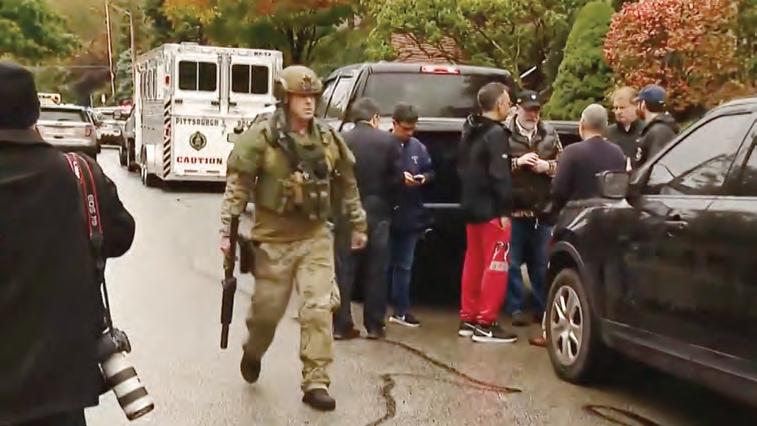
It is the first time they have spoken publicly about Oct. 27, 2018, outside of the trial of the shooter, according to filmmakers.
Both Leger and Wedner are featured in the film as well, sharing honest and heartbreaking testimonies of what they saw and endured during the attack, and their personal journeys of recovery.
The documentary was produced by “The Debrief with Jon Becker,” a podcast examining tactical operations and crisis response.
The hour-long film, which premiered Aug. 26 at the National Tactical Officers Association’s Law Enforcement Operations Conference in Washington, D.C., is now streaming on YouTube.
On Oct. 27, 2018, an antisemitic gunman entered the Tree of Life building during Shabbat services and shot everyone he saw. Armed with multiple firearms, “he engaged in a prolonged firefight with Pittsburgh police and SWAT units,” the filmmakers
said. “The incident tested the limits of tactical response, coordination under fire, and post-incident resilience.”
In “Confronting Hate” viewers learn details about the tactical decisions made by the first responders, and about their roads to physical and psychological healing following the trauma they sustained that day.
Notably, the shooter’s name is not mentioned in the film.
“Although there have been several documentaries made about Tree of Life, we were deeply troubled by two things: the attention paid to the perpetrator of the attack, and the complete disregard for the men and women who responded to the event,” said Jon Becker, host of “The Debrief” and producer of the film. “This film isn’t about the killer, his motives, or the political views surrounding the incident. It’s about the heroes who stopped him. We focus entirely on the responders, their courage, and the lasting impact of that day, ensuring the victims’ names are remembered and the attacker’s is forgotten.”
The documentary is available to stream on YouTube under the show’s channel, @ thedebriefwithjonbecker. PJC
Toby Tabachnick can be reached at ttabachnick@pittsburghjewishchronicle.org.

p Pittsburgh SWAT team member Bob Stroschein leaving the scene of the synagogue shooting Photo courtesy of Jon Becker, via Steve Mescan
Celebrations
Bar Mitzvah
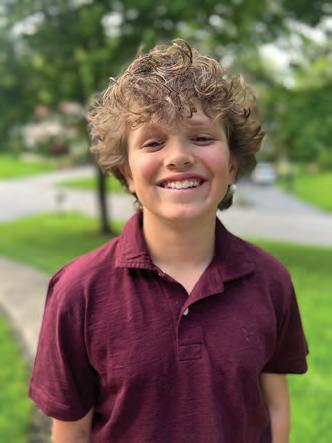

Bennett James Pries, son of Lilia and James Pries, will become a bar mitzvah on Saturday, Sept. 6, at Beth El Congregation of the South Hills. Grandparents are Tema and Norman Kerman of Pittsburgh, and Bea and Pat Pries of Bluffton, South Carolina.
Birth
Susie and Don Gross are thrilled to announce the birth of their granddaughter Cameron Lucy born on May 25, 2025. Cameron is the daughter of Michael Gross, formerly of Point Breeze, and Jen Lande Gross formally of Carmel, Indiana. Proud local greatgrandparents are Patty and Stanley Levine. Cameron, her parents, and sister, Dylan Rose, are currently residing in Chicago.

Parashat Ki Tetzei contains a plethora of mitzvot touching on several areas: family relationships, justice, modesty, fair treatment of human beings (and even animals), and conduct during war. While many of these laws seem ethically sound, there is one particularly troubling passage:
“If a householder has a wayward and defiant son, who does not heed his father or mother and does not obey them even after they discipline him, his father and mother shall take hold of him and bring him out to the elders of

his town at the public place of his community. They shall say to the elders of his town, ‘This son of ours is disloyal and defiant; he does not heed us. He is a glutton and a drunkard.’ Thereupon his town’s council shall stone him to death.” (Deuteronomy 21:18-21)
This law is shockingly extreme. Killing a child who is ill behaved raises serious moral questions. How can death be an appropriate punishment for a minor, when tradition holds that children below the age of b’nei mitzvah cannot be responsible for their actions? Are children’s personalities so fixed that no education or rehabilitation can work? Is there no hope for such children to grow up and become responsible members of society? And to state the obvious: Who among us has not raised a child who at some point was defiant and disobedient? Are we to put most of our adolescent population

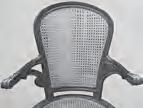




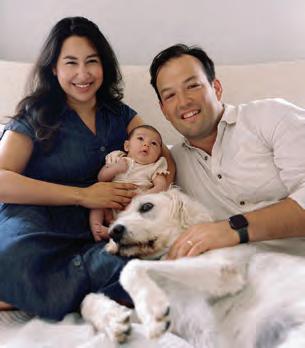
With gratitude and joy, Lillian and Evan Miller of Bloomfield announce the birth of their daughter, Ruby Shaina , born on July 8. Ruby is warmly welcomed by proud grandparents, Elaine and Todd Miller, and Hela and Leon Edelsack, all of Squirrel Hill. She is named for her maternal great-grandmother, Rita Edelsack (z’l), and paternal great-grandmother, Shirley Krouse (z’l).
Engagement
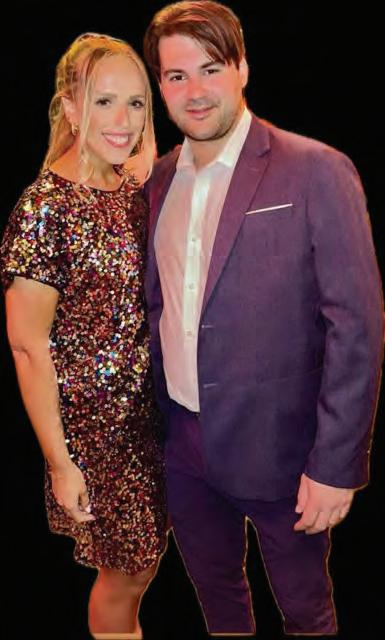
Harvey Cohen, formerly Squirrel Hill, and Katie Cohen, now of Naples, Florida, announce the engagement of their daughter, Shira A. Cohen, to Ryan Davlantes of Chicago. Ryan is the son of Colette and John Davlantes of Northbrook, Illinois. Shira is public relations manager at West Monroe Partners and Ryan is in supply chain for Ferrero and Director of Hockey at Notre Dame College Prep. PJC
to death for being sassy, impertinent, or unruly?
The law of the rebellious child also contradicts a core tenet of Judaism that is particularly salient at this time of year: teshuvah (repentance). A famous incident in the Talmud brings this point home: When Rabbi Meir prayed that certain ruffians should die, his wife Beruriah redirected him to pray instead for them to repent (Berachot 10a). The Rabbis believed that the gates of teshuvah are always open, that it is never too late to ask for forgiveness and mend our ways. We open Kol Nidre with the statement that we are permitted to pray alongside those who sin. Yom Kippur wipes the slate clean for all who seek atonement for their wrongdoing.
What happens when a command in the Torah contradicts Rabbinic theology? Our Sages did not believe in eliminating mitzvot that are found in the Torah, however much they might offend sensibilities. Instead, the Rabbis created laws to limit the possibility of ever carrying out the punishment that the Torah prescribed for the rebellious child. The Talmud, in tractate Sanhedrin, limits the applicability of the law to a son and not a daughter, during a very short span of time around puberty, and only if he consumes a large portion of specifically meat and wine. He is considered liable only if he stole the meat and wine from both
his father and mother, only if his parents rebuked him with identical words, and only if the parents look identical to each other. He must be brought to a court of three judges to be warned, and if he sins again, he must be judged by a court of those same three judges plus 20 more. Indeed, Rabbi Yehuda says that there never was, and never will be, a rebellious child stoned to death. Clearly, the Rabbis took great pains to ensure that the Torah law they found morally repugnant could never be actualized. This is not the only example of a Biblical law that undermines a central Jewish value. We are not Biblical Jews. The oral Torah grew and developed over many centuries, concretizing morals and values that did not always align with the written Torah. Our Sages believed in their own convictions, even when Biblical law contradicted them. Their vision was of a Judaism that lives and breathes in response to generations whose perspectives evolve over time. That is the Judaism that we have inherited. It is an inheritance I, as a modern Jew, treasure. PJC
Rabbi Amy Bardack is the spiritual leader of Congregation Dor Hadash. This column is a service of the Greater Pittsburgh Jewish Clergy Association.
Obituaries
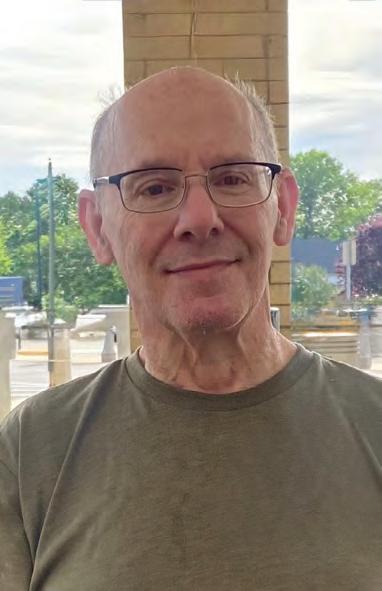
BRISKIN: Kenneth Scott Briskin, age 67, passed away peacefully on Sunday, Aug. 24, 2025. Loving father of Justin Briskin and Garret (Guillermo) Briskin. Son of the late Leonard and Nancy Briskin. Cherished brother of Stephen (Margie) Briskin and Claire (Mark) Rast. Kenneth was the owner and operator of Briskin Furs. Graveside service and interment were held at West View Cemetery of Rodef Shalom Congregation. Arrangements entrusted to Ralph Schugar Chapel, Inc. schugar.com
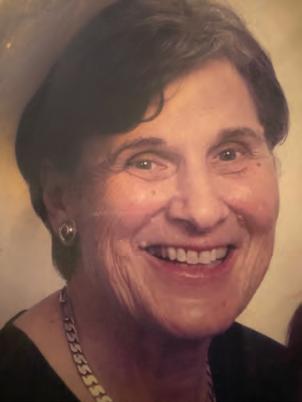
The world has lost a husband, father, grandfather, great-grandfather, brother, student, teacher, attorney, mentor, business leader and friend. Charles C. Cohen (“Chuck”) passed away on Aug. 27, 2025, after a short illness. He left a legacy of kindness, dedication, professional and personal excellence, humor and a deep love for his family and mmunity. His memory will be cherished by all who had the privilege of knowing him. Chuck was born in Pittsburgh in 1941, graduated from Steubenville (Ohio) High School in 1958, Dartmouth College in 1962 and University of Michigan Law School in 1965. He started his legal career at Reed Smith Shaw & McClay in Pittsburgh before co-founding Cohen & Grigsby (now Dentons Cohen & Grigsby) in Pittsburgh in 1981. During his nearly 60-year career as a practicing lawyer, Chuck concentrated on matters of corporate governance, securities regulation of capital formations and business combinations. For more than 50 of those years, he was a dedicated member of the faculties (at various times) at the University of Pittsburgh School of Law, Ave Maria School of Law, Duquesne University Law School and West Virginia University School of Law. He served on many occasions as an expert witness, arbitrator, mediator and lecturer in continuing legal education programs, and he also served on countless public and private corporate boards and as trustee of several charitable organizations. Chuck was dedicated to his distinguished career, his professionalism, his authorship, his never-ending studies, his business partners and his friends, but he was most intensely dedicated to and focused on his family. He is survived by his wife, Michele McKenney, his three children and their spouses, Andrew and Anne Cohen, Jed and Debbie Cohen, Sari Cohen and Adam Pollak; his 11 grandchildren and six great-grandchildren; his brother Henry and his wife Caryl Cohen, as well as his first wife, Amy Cohen. Chuck will be remembered for his generosity, wisdom, humor and the warmth he shared with everyone. His legacy lives on in the hearts of all whom his rich and full life touched. Funeral services were held at the Chabad of Squirrel Hill. Interment Homewood Cemetery. In lieu of flowers, the family requests donations be made to Chabad of Squirrel Hill or The Eye and Ear Foundation of Pittsburgh in Chuck’s memory. Arrangements entrusted to
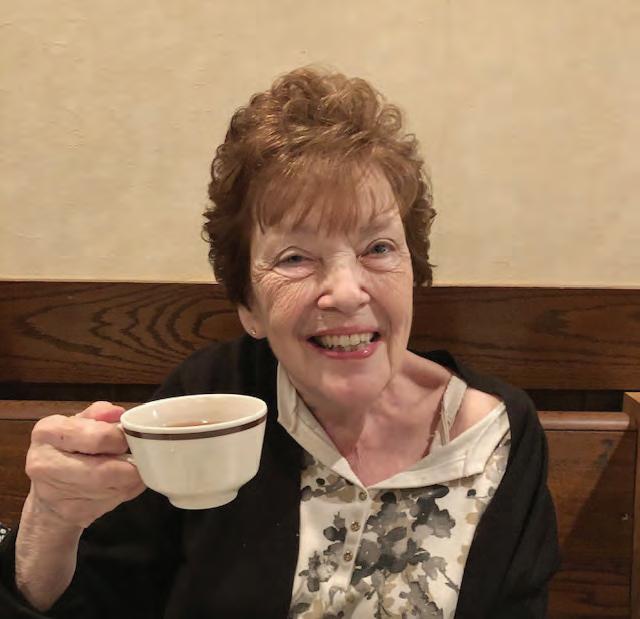
Rita Krauss Cohen, age 80, of Plum, passed away on Aug. 28, 2025. Born in Pittsburgh, he was the beloved wife of the late Jay Cohen; devoted mother of the late Eric Cohen and Lisa (Alan) Carney; loving grandmother of Jacob Carney and Alan (Mallory) Carney; great-grandmother of Jolene Carney; cherished sister of the late Sandra Jacob and the late Robert Krauss; and loving daughter of the late artin and Ethel Krauss; she also cared very deeply for her niece Amy (Barry) Kubas and her reat-nephews Sam and Max. Rita spent her career caring for others, first as a medical secretary at West Penn Hospital, and later as a pharmacy technician at The Medicine Shoppe and Shop ‘n Save Pharmacy. She was known for her warm spirit, love of crafting, and endless conversations with her many friends — often picking up the phone at 1 a.m. as if it were the middle of the afternoon. Rita’s joy for life shone through in the little things: a cup of hot tea, a donut and a good laugh. She was always willing to do anything or go anywhere at any time — she always felt it was an adventure. She will be remembered as friendly, fun and deeply devoted to her family and friends. Services were held at Ralph Schugar Chapel, Inc. Interment Beth Shalom Cemetery. Contributions may be made to the Alzheimer’s Association, Greater Pittsburgh Chapter (alz.org). May her memory be a blessing. schugar.com
DEAKTOR: Marcia Aarons Deaktor, October 1931-August 2025. Marcia Aarons Deaktor passed away peacefully on Aug. 24, 2025, surrounded by love and family. A longtime resident of Pittsburgh, she spent the last four years as a resident in Boca Raton, Florida. Born in Pittsburgh to William B. and Hilda Aarons, Marcia was raised alongside her adored older sister Jean. From a young age she showed an extraordinary sense of responsibility, often helping in her family’s business in Georgia. She carried that same determination and work ethic throughout her life. Marcia was a 1952 graduate of the University of Georgia, where she earned a bachelor’s degree in journalism. On
a visit to Pittsburgh to see family, fate intervened when she was set up on a blind date with the man who would become the love of her life, Charles L. Deaktor. From the moment he saw her, Charles was infatuated, so taken with Marcia that he could hardly eat his meal, though he always remembered exactly what she ordered that night. They married soon after and shared a beautiful life together until Charles’ passing in 1995. Marcia had a lifelong love of real estate, pouring her heart into her work. She also had a deep appreciation for art, architecture, nature and animals. She once hosted an art show in her home for charity and delighted in collecting pieces from emerging artists. Her favorite place, though, was her garden on Ellsworth Avenue, where she found peace in tending to her plants. Marcia was predeceased by her beloved sister Jean. She is survived by her children Anne Baker (Marvin), Scott Deaktor (Marsha) and Carol Mirsky (Brian), as well as her four cherished grandsons, Charles “Chase” Leonard Deaktor II, William Aaron Deaktor, John Mirsky and Charlie Mirsky, all of whom brought her immense pride and happiness. Marcia will be remembered for her elegance, warmth and generous spirit, but most of all for the boundless love she gave to her family. Services were held at Ralph Schugar Chapel, Inc. Interment West View Cemetery of Rodef Shalom Congregation. In lieu of flowers, we are asking that donations be made to the Humane Animal Rescue of Pittsburgh using the following link (humaneanimalrescue.org/donate/). schugar.com
GOLD: Elinor J. “Ellie” Gold, 86, died on Monday, Sept. 1, 2025. She was the beloved daughter of the late Jane and Jack Goldberg, sister of the late Richard Goldberg of Potomac, Maryland, and granddaughter of the late Ada and Al Oppenheimer. Ellie was born and raised in Greensburg, Pennsylvania. She studied at the University of Pittsburgh, then transferred to and graduated from Chatham College in 1959. She married Sanford B. Gold, a real estate developer and broker from Squirrel Hill, and a year later, the couple moved to Monroeville, where they raised their three children. Ellie worked at The Fashion Store in Vandergrift, Pennsylvania, until becoming a grandmother, and spent free time creating professional-quality quilts and other sewing projects. Her greatest love was time spent with family. Among her volunteer activities, Ellie was an early activist for the recycling movement in the 1970s via the Group for Recycling in Pennsylvania (GRIP). She was involved in Temple David Sisterhood, ORT and as a youth group supervisor. In her later
Please see Obituaries, page 20
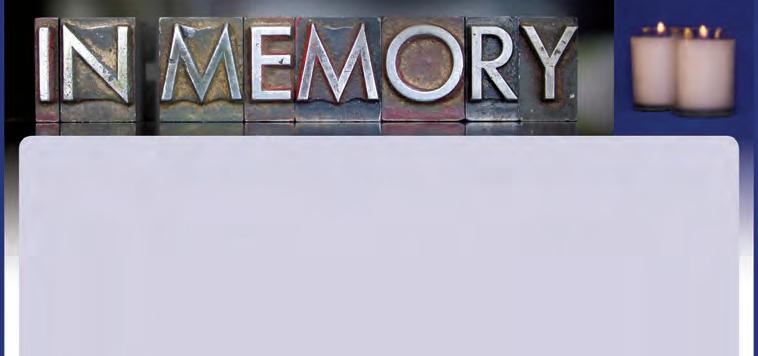
Jewish Association on Aging gratefully acknowledges contributions from the following:
gift from ...
Marilyn Friedlander
Edward M Goldston Z"L
Mary Jatlow
Susan Neuwirth Johnson
Howie & Shelley Miller
Linda Rattner Nunn
Simma & Lawrence Robbins
Mr & Mrs Harvey E Robins
Edith Flom Schneider
Eileen Snider & Family
Bill Snider & Family
Lois Solomon
Edris Weis
Edris Weis
David Wolfson
Contact the Development department at 412-586-2690 or development@jaapgh.org for more information. THIS WEEK’S YAHRZEITS —
Sunday September 7: Max Breverman, Harvey Deaktor, Isadore J Ficks, Etta Glass, Howard Sylvan Guttman, Ethel Kanselbaum, Norris Lee Lipman, Isreal Miller, Sidney Pariser, David Vinocur, Mary Weintraub
Monday September 8: Morris Abrom, Michael Balmuth, M .D , Jacob Berman, Mendel Binstock, Ben Cartiff, Martin David Gillis, Goldie Harris, Simon Jonas, Esther Friedberg Levy, Charles Papernick, Charlotte Levy Pollack, Louis A Robins, Florence H Szobel, Cyril Freda Wolfson
Tuesday September 9: Ben Astrov, William Flom, Aaron Green, David Lester, Francis Nadler, Mamie Grace Rosenbloom, Pauline Roth, Shiffra Schneirov, Pauline Naomi Shorr, Mendel Silverman, Edith Symons, Emanuel L Wasser
Wednesday September 10: Regina Berg, Ethel Borovetz, Celia Grudzinsky Catz, Joseph Gelman, Lillian Ohringer Girson, Louis Goldberg, Barbara Goldstein, Louis Hershenson, Herbert Isaacs, Leon Kweller, Leon Lappin, Pearl Beck Levy, Norma Lewis, Essie Jacobs Marcus, Martin S Morrow, William Richman, Rose Leib Rothman, Mollie Steinman, Selma Volkin, Joseph Weitzman, Belle Strauss Wilder
Thursday September 11: Justine Becker, Pessie Esman, Nathan Glantz, Leah A Gluck, Toby Goldberg, Martha Hirsch Green, Bess Z Kaufmann, Morris Kessler, Leah Tobias Levy, Rose Mikulitzky, William Miller, David Pecarsky, Goldie Rubin, Lena Ruttenberg, Estelle Rae Sable, Martin S Taxay, M .D , Joseph N Verk
Friday September 12: Minnie E Aberman, Emanuel Hyman Bennett, Isadore Brown, Ted Brown, Norma Cohen Dobrushin, Marilyn B Neuwirth Herron, Julia Kitman, Fannie Liebman, Lillian E Friedman Pachtman, Sadie Rebecca Ruttenberg, Benjamin C Simon, Meir A Weiner, Meyer Wolk, Irving S Zamore
Saturday September 13: Sam Carson, Elizabeth Marine Chaiken, Esther F Cohen, Sadie Friedland, Leonard H Goldberg, Samuel Henry Harris, Ella Herman, Henry H Katz, Anna C Kenner, Samuel G Osgood, Benjamin L Schulman, M .D , Yetta B Sirota, Ruth Soffer, Bennie Star, Lawrence Swartz, Harry H Wyner, Oliver Zimmer
Obituaries
Obituaries:
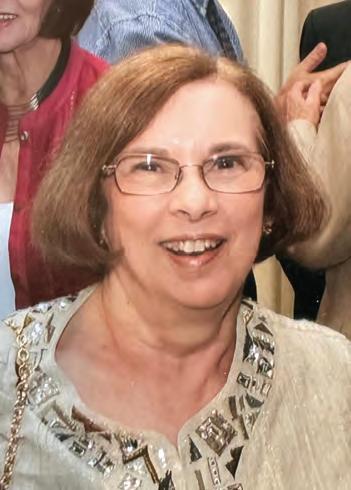
years, she served on the board of the Jewish Family and Community Services. Ellie is survived by her children: Bob (Amy) Gold and Sue (Scott) Long of Squirrel Hill, and Karen Gold Anisfeld of Kfar Saba, Israel; grand children: Jess (Mk) and Jake (Morgan) Gold, Julie (Cai) Evans and Jordan Long (Melanie Vera), and Alon (Sivan) Anisfeld; great-grandchildren: Jaqob, Jimmy, Leeya, Lennie, Asher and Ellis. She is also survived by her beloved nieces, nephews, grandnieces and grand nephews, and friend and caregiver, Donna Ristoff. Services were held at Ralph Schugar Chapel, Inc. Interment Temple Emanu-El Cemetery, Greensburg, Pennsylvania. Donations in memory of Ellie Gold may be made to the Jewish Family and Community Services of Pittsburgh, 5743 Bartlett Street, Pittsburgh, PA 15217, and the Jewish Community Center of Pittsburgh, 5738 Forbes Avenue, Pittsburgh, PA 15217. schugar.com
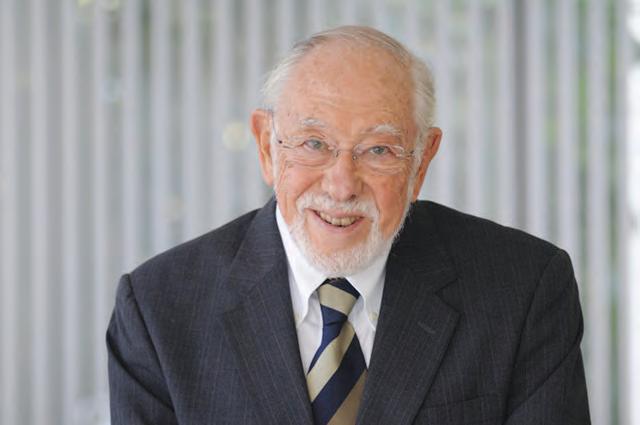
KANN: Linda Sue Kann, on Aug. 31, 2025. Loving daughter of the late Nathaniel P. and Evelyn Kann. Cherished sister of the late Richard E. Kann (Barbara Zimmer Kann). Beloved aunt of Andrea Kann and Daniel Kann (Dana). Also survived by great-nephews Toby and Jackson, great-nieces Zoey and Sadie, and friends. Many thanks to Linda’s devoted caregiver Lisa Biggs and others, as well as the Jewish Association on Aging. Linda was a longtime resident of Weinberg Terrace. Graveside service and interment were held at Beth Shalom Cemetery. Contributions may be made to the Jewish Federation of Greater Pittsburgh, 2000 Technology Drive, Pittsburgh, PA 15219. Arrangements entrusted to Ralph Schugar Chapel, Inc. schugar.com
MEYERS: Jack Allen Meyers, 92, of Pittsburgh, passed away peacefully on Aug. 28, 2025.A lifelong Pittsburgher, Jack was born on March 19, 1933, to Anne and Louis Meyers. He attended Taylor Allderdice High School, graduating in 1951. He went on to earn a bachelor’s degree in industrial management from the Carnegie Institute of Technology in 1954. He was a proud veteran of the U.S. Army, serving our country honorably. After his military service, he joined his father in their family business, Meyers Plumbing & Heating Supply Co., a business established in 1902









by Jack’s grandfather. Jack spent his entire professional career leading and growing MP&H, catering to both institutional and residential customers in the greater Pittsburgh area. Jack continued to run the company with his brother-in-law until Jack’s retirement in 2004. Jack was fond of saying that his successful business career allowed him to do the more important work in his life — dedicating himself to family and community. He began his volunteer work with the Jewish Federation of Greater Pittsburgh’s fundraising campaigns and continued to be committed to the UJF by holding many leadership positions. He was passionate about Jewish education, which led to his involvement as a founder of Pittsburgh’s Community Day School and numerous other roles, both locally and nationally. In 1971, Jack and his wife first traveled to Israel. They arrived as tourists and departed as dedicated Zionists. He organized and chaired the first Shaliach program, which brought Israeli emissaries to western Pennsylvania. Jack was particularly proud of his appointment to, and service on the board of the Joint Distribution Committee. Jack’s love of Israel prompted him to visit the country more than 50 times, resulting in a deeper connection to Israel and the cultivation of many lifelong friendships. While volunteerism was important to him, above all else, Jack dedicated himself to his relationships with his family and the friends who became part of his family. He relished spending winters at his home on Longboat Key, Florida, with so many friends and family. Whether as a planner of trips across the country and around the world, a creative problem solver, or as a sage provider of advice, those closest to him knew Jack as the warm and caring person on whom they could rely. Jack is survived by his loving and dedicated wife of 62 years, Bernice, and his children, Marcy, Michael (Esther) and Matthew (Heidi). Jack was the proud grandfather of Lea, Paz, Abby, Simon, Ruby and Lewis. He is also survived by his sister, Tibey Falk. Jack is predeceased by his parents, Anne and Louis Meyers. Jack will also be missed by many loving relatives, including sistersin-law, brothers-in-law, nieces, nephews and cousins, as well as dear friends, across generations. Jack’s family would like to express their gratitude to his many doctors and healthcare professionals who provided exceptional care over many years, and to his caregivers, who were instrumental in allowing him to maintain his quality of life and dignity until the end. Services were held at Ralph Schugar Chapel, Inc. Interment at Beth Shalom Cemetery. Contributions may be made to the Jewish Federation of Greater Pittsburgh (jewishpgh.org/) or the charity of your choice. schugar.com


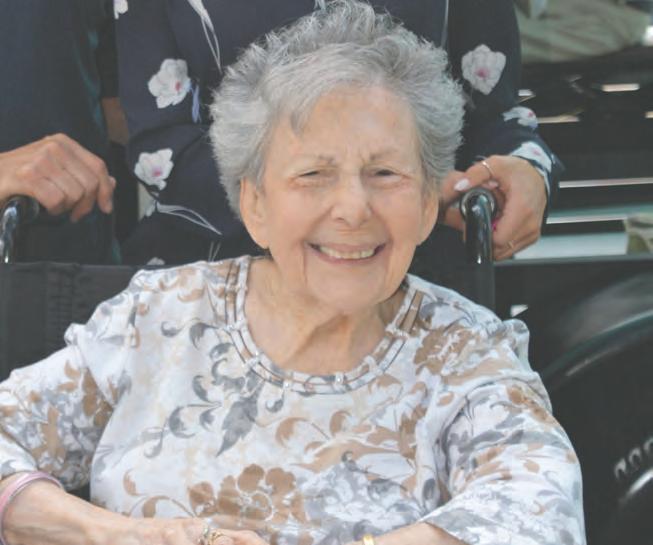
Rose Mervis Wyner, on Aug. 29, 2025. Beloved wife of the late Melvin L. Wyner. Loving mother of Robert (Fran) Wyner of Monroeville, Pennsylvania, and the late Stanley Wyner of Buffalo, New York. Cherished sister of the late Harry Mervis, Earl Mervis, Teddy Mervis, Louis Mervis, Abe Mervis, Esther Tutwiler and Sarah Friedman. Cherished grandmother of Elizabeth (Adam) Klitzner, Edward (Yvonne) yner, Jessica Wyner and Sammy (Brittany) Wyner, and four great-grandchildren. Also survived by many nieces, nephews, great-nieces and -nephews, and dear adopted daughter JoAnn (Perry) Harrop. Services were held at Ralph Schugar Chapel, Inc. Interment Homewood Cemetery. Contributions may be made to Weinberg Terrace (Jewish Association on Aging), Attn: Development, 200 JHF Drive, Pittsburgh, PA 15217, or a charity of donor’s choice. schugar.com PJC






























Real Estate

Contact me today to discuss all of your real estate needs!
Sherri Mayer, Realtor Squirrel Hill Office C: 412-760-0412 O: 412-421-9121x225 sherrimayer@howardhanna.com HowardHanna.com



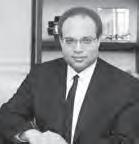


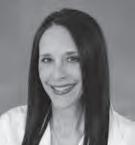


Smith-Rosenthal Team
Jason A. Smith & Caryn Rosenthal
Jason: 412-969-2930 | Caryn: 412-389-1695 Jasonasmith@howardhanna.com Carynrosenthal@howardhanna.com





















































More an Aliyah: How Nefesh B’Nefesh Is Rede ning What It Means to Come Home
For many North American Jews, Aliyah is an expression of values—a deliberate step toward building a purposeful life in their Jewish homeland. It’s about raising children in a society shaped by Jewish culture and identity, contributing to the future of the State of Israel, and becoming part of something larger than oneself.
Nefesh B’Nefesh (NBN) began 24 years ago when Tony Gelbart and Rabbi Yehoshua Fass set out to help North American Jews overcome the bureaucratic and emotional hurdles of immigration and support their transition to a new life in Israel. Since then, the organization has helped more than 90,000 Olim not only make Aliyah, but build meaningful lives as contributing members of Israeli society and finding solutions for many of the nation’s pressing needs. The remarkable 90% retention rate is proof of how NBN has helped so many Olim integrate and thrive while building up the country.
Today, NBN’s work spans far beyond flight logistics, paperwork, and navigating bureaucracy. It’s become a strategic player in Israel’s national development, an advocate for Lone Soldiers, and an educational force that engages Jews around the world with the evolving story of Zionism.
“We’re not just helping people get here,” says Marc Rosenberg, Vice President of Diaspora Partnerships.
“We’re helping them succeed. It’s about coming with honest expectations and discovering how meaningful life in Israel can be.”
Supporting Aliyah from Every Angle
Over the decades, NBN’s mission has evolved in response to the changing needs of Israeli society and its growing community of Olim. The organization’s activities have naturally expanded into four transformational pillars: the core mission of Aliyah and integration, support for Lone Soldiers and national service volunteers, initiatives that promote workforce development and regional growth, and educational programs that deepen global Jewish connection to Zionism. Together, these pillars address vital national priorities while reinforcing the long-term success of those who choose to call Israel home.
The changes emerged organically, as needs surfaced. When increasing numbers of Olim began serving in uniform, NBN launched its National Service initiative. What began as ad hoc support evolved into a robust system in collaboration with existing mechanisms, offering emotional support and practical guidance for
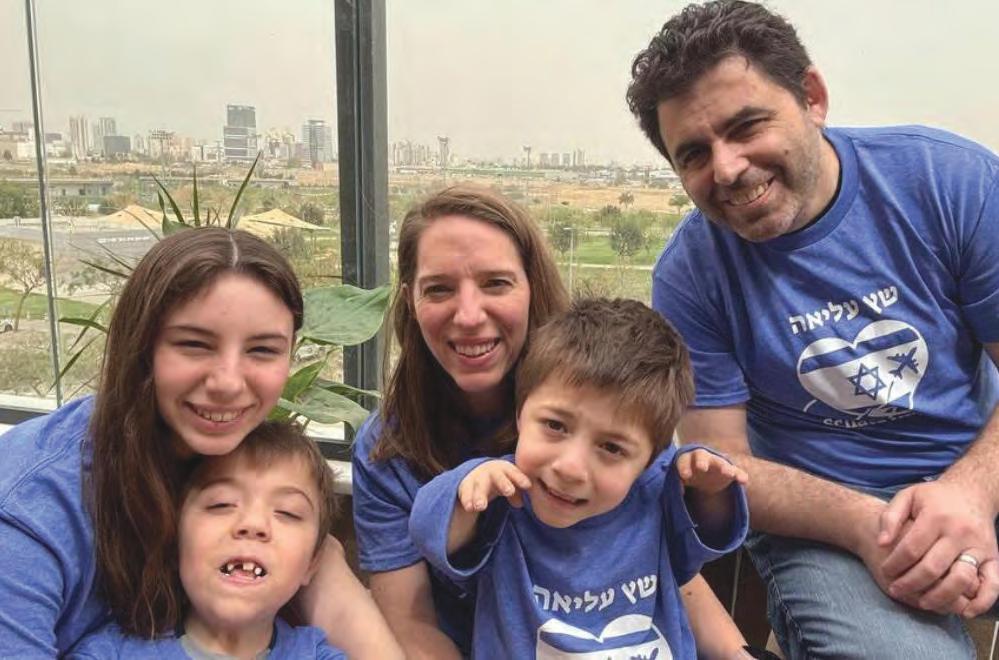
Lone Soldiers and Lone Bnot Sherut from around the world. Recently, NBN unveiled the Bnot Sherut Residence, a state-of-the-art housing complex in Jerusalem that is set to open in August. This pioneering residence o ers beautifully furnished apartments, onsite sta , a gym, lounge, and amenities—ensuring a true home away from home for over 100 serving volunteer women.
The National Development pillar reflects NBN’s growing role as a life-changing catalyst for professional integration and national workforce enrichment. Its signature initiative, MedEx, was launched in direct response to Israel’s pressing shortage of physicians, helping North American doctors fast-track their Israeli licensure through intensive lobbying of the Health Ministry and strategic coordination with key decision-makers. What began as a targeted e ort has since evolved into the International Medical Aliyah Program (IMAP), in partnership with Israel’s Ministries of Aliyah and Integration; Health; Negev, Galilee, and National Resilience, as well as The Jewish Agency for Israel, and bolstered by key partners including the Marcus Foundation, the Gottesman Fund, Jewish Federations of North America, the Azrieli Foundation and Arison Foundation, now serving medical professionals from around the world and channeling their expertise into Israel’s healthcare
system—where it’s needed most. NBN’s National Development pillar also includes programs that encourage Olim to settle in Israel’s peripheral regions—the Negev and Galilee—by o ering extra support, professional integration, and community resources. These e orts help bolster Israel’s geographic growth while o ering Olim meaningful places to live and thrive.
The newest pillar is the Zionist Education Initiative (ZEI). This program hosts thousands of gap-year students, school groups, and visiting missions at NBN’s centers in Jerusalem and Tel Aviv. Through storytelling, seminars, and field experiences, ZEI fosters personal connection, Jewish identity, and awareness of Olim’s ongoing contributions.
“It’s not about urging people to make Aliyah,” says Rosenberg. “We’re telling the story of Israel through the people who choose to live it. That understanding deepens everyone’s connection—whether they decide to make Aliyah or not.”
From Vision to Action
A seasoned physician from Pennsylvania, Dr. Ti any Schatz attended MedEx conferences in New Jersey in 2023 and 2024, intrigued by the opportunity to practice medicine in Israel. Her family had already begun considering Aliyah—but the trauma of October 7 transformed that consideration into a call to action.
Within weeks, she and her husband, Yaakov, accelerated their plans and turned to NBN to help make the move a reality.
“After October 7, we felt we had to stand with Israel and contribute our skills,” Ti any said. “That shift— from personal ambition to national service—made the decision clear.”
The sacrifices were steep. Ti any left behind a thriving private clinic. Yaakov, a tech entrepreneur, walked away from a startup that was just weeks from launching. Their choice of Be’ersheva was guided by Ti any’s previous ties to Soroka Medical Center, and a sense that this was where they could make the greatest impact.
Ti any’s message to others is direct and heartfelt: “There are so many Jews who dream of Aliyah, but fear and the unknown hold them back. If that’s really what they want, nothing should stop them—not timing, not jobs, not kids. Sometimes you just have to take the leap to make the dream come true. We jumped—and thank God—we landed exactly where we were meant to.”
“It’s easier than ever to make Aliyah,” Rosenberg adds, “but that doesn’t take away from the challenge of uprooting and leaving everything behind. That’s why we’re constantly advocating, streamlining, and problem-solving. Every Oleh has a story—and it’s a privilege for me to be a part of it.” ■
The Schatz family in Be’er Sheva
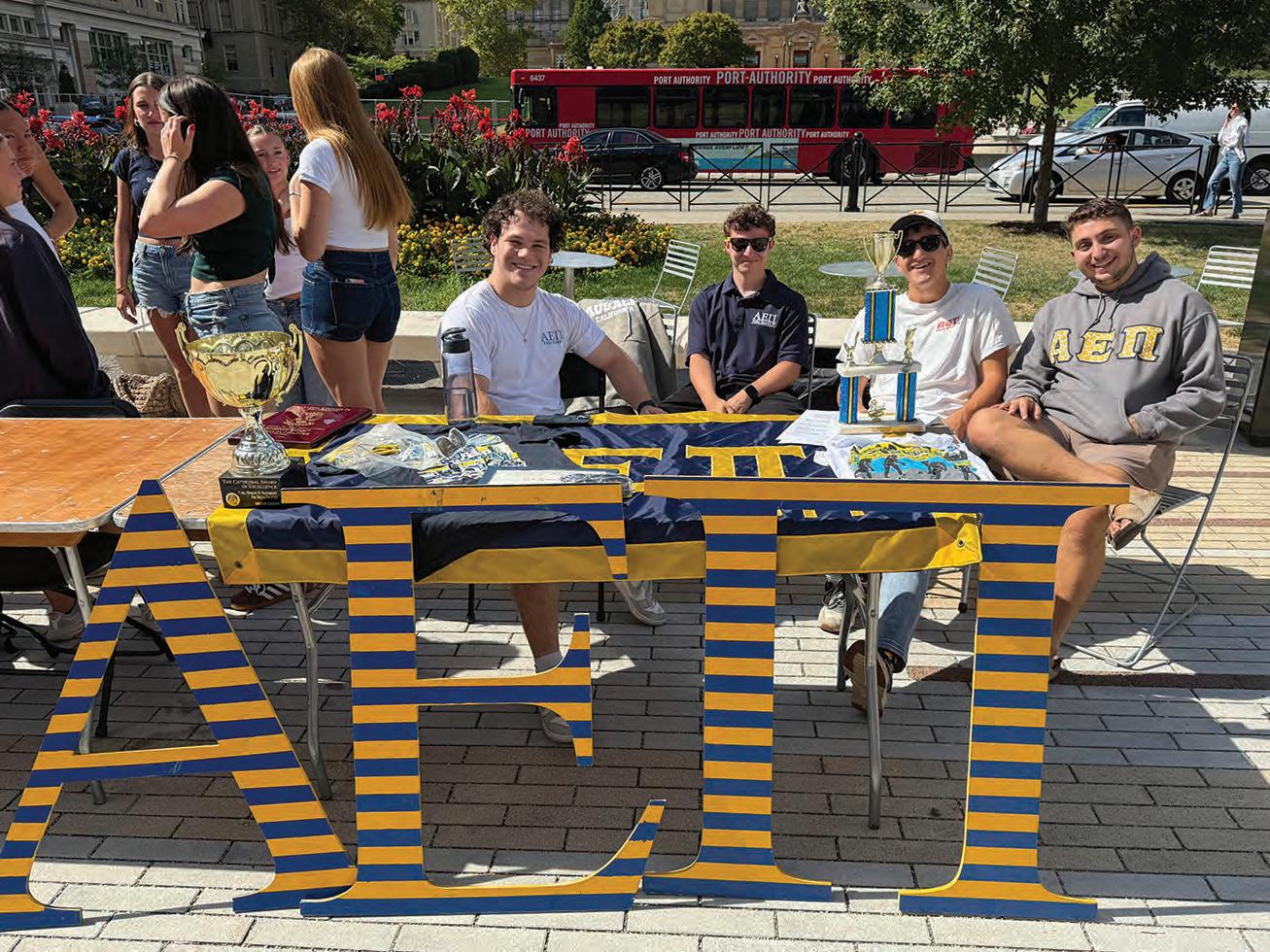
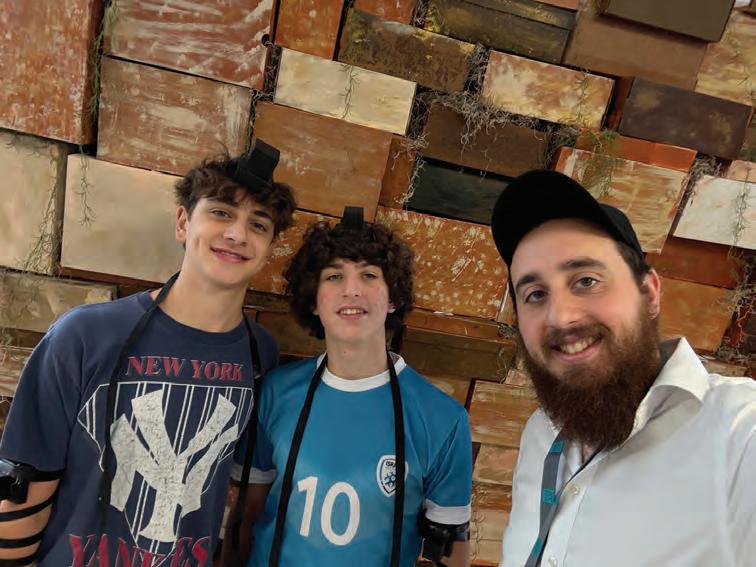
Big day, big cake
Students from Yeshiva Schools of Pittsburgh returned to school after a restful summer vacation. A delicious back-to-school treat awaited entrants at the door.
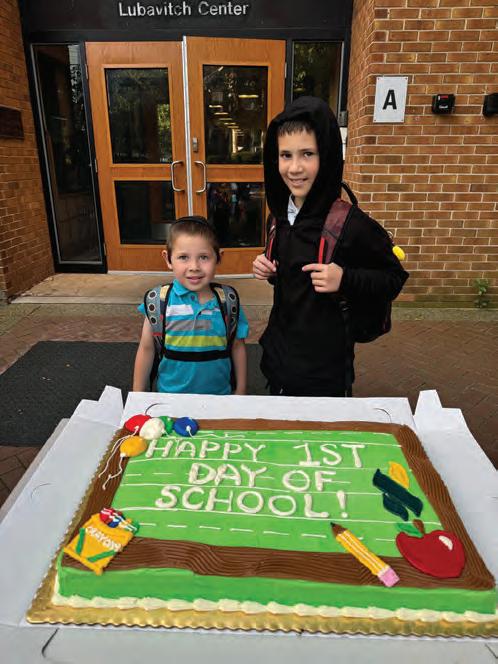
A back to school barbecue welcomed students, families and staff back to Hillel Academy of Pittsburgh. Aided by bounce houses, hot dogs and an ample supply of Rita’s
participants enjoyed

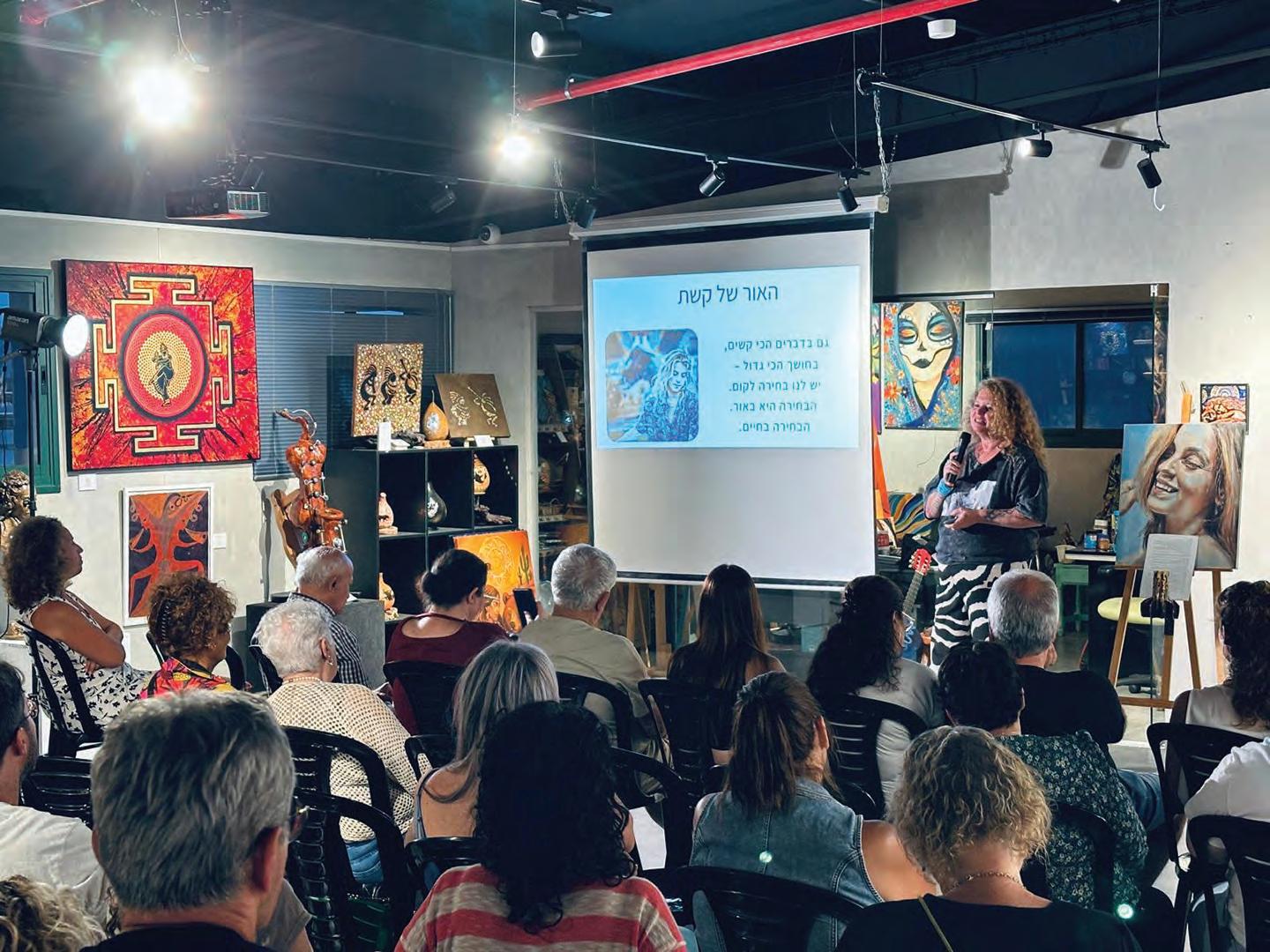
WeArt Gallery in Karmiel welcomed Natalia Casarotti for a conversation about loss and strength. Casarotti’s daughter, Keshet Casarotti, was murdered on Oct. 7, 2023, at the Nova Music Festival. Residents from Karmiel (Pittsburgh’s sister city) and nearby
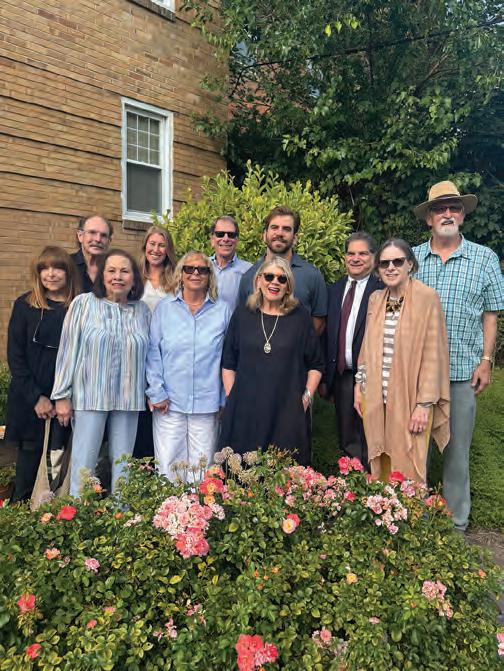
Michele Gray-Schaffer, (front row center) hosted a garden party in honor of her late friend Margaret “Peg” Cohen. The garden project was endowed by Cohen and led by Gray-Schaffer as a gift to the residents of Jason Kramer Hall, who are served by
p
Photo courtesy of Ronit Itzikson Feldman
Photo courtesy of The Branch
ice,
p
Photo courtesy of Hillel Academy of Pittsburgh
Lay it on Yitzchak Goldwasser of Chabad of Greenfield joined teens at the JCC Maccabi Campus Games
p Mitzvahs and memories
Photo courtesy of Chabad of Greenfield
Members of Alpha Epsilon Pi at the University of Pittsburgh joined other fraternities and sororities, including Zeta Beta Tau,
p
Photo by Jim Busis
p
Photo courtesy of Yeshiva Schools of Pittsburgh
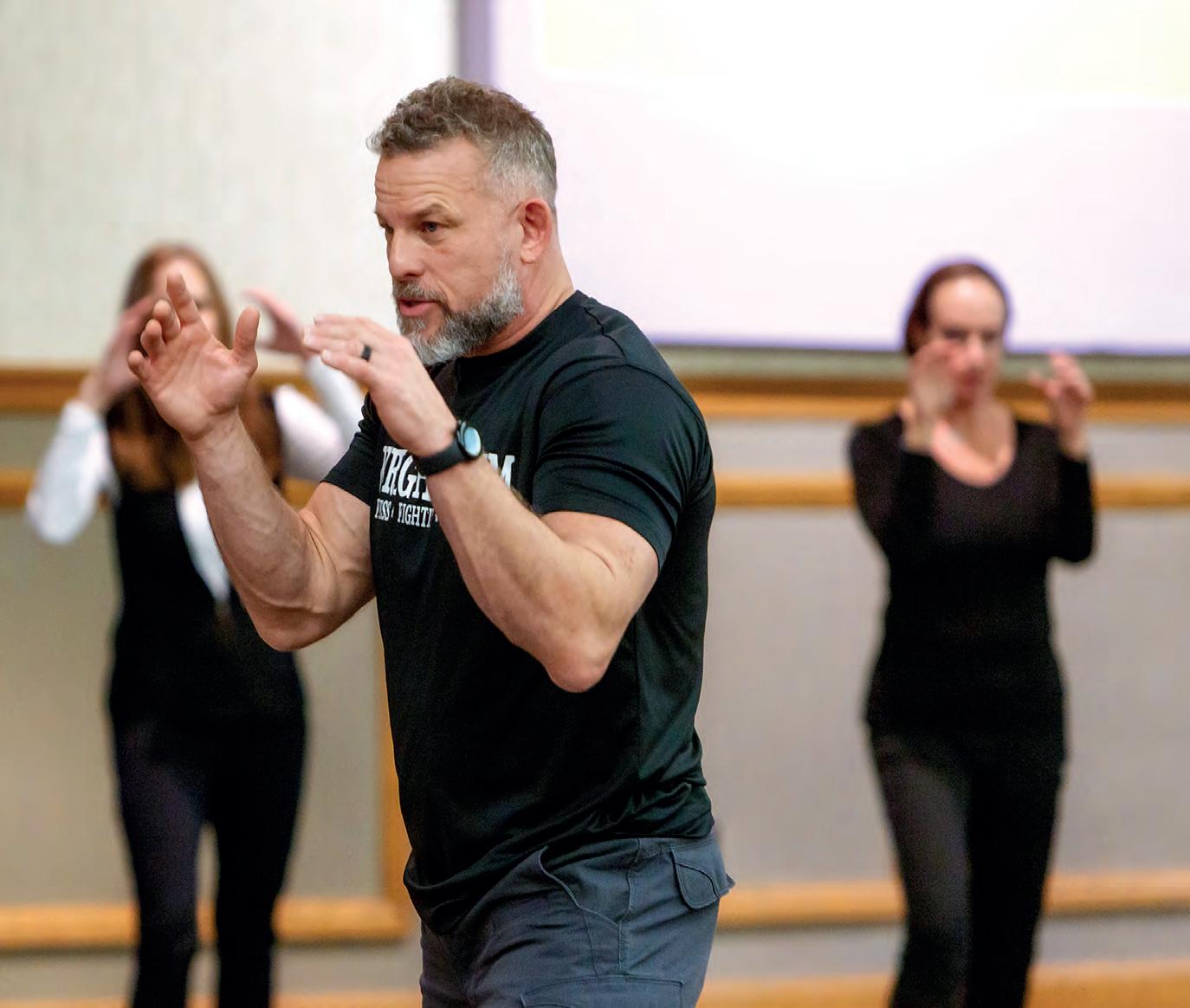
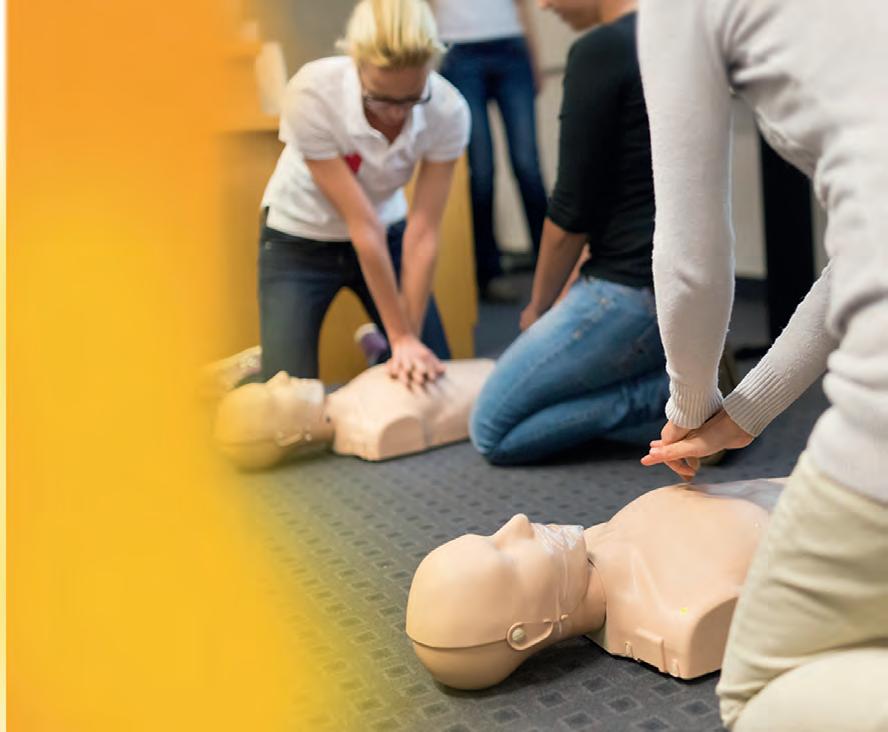
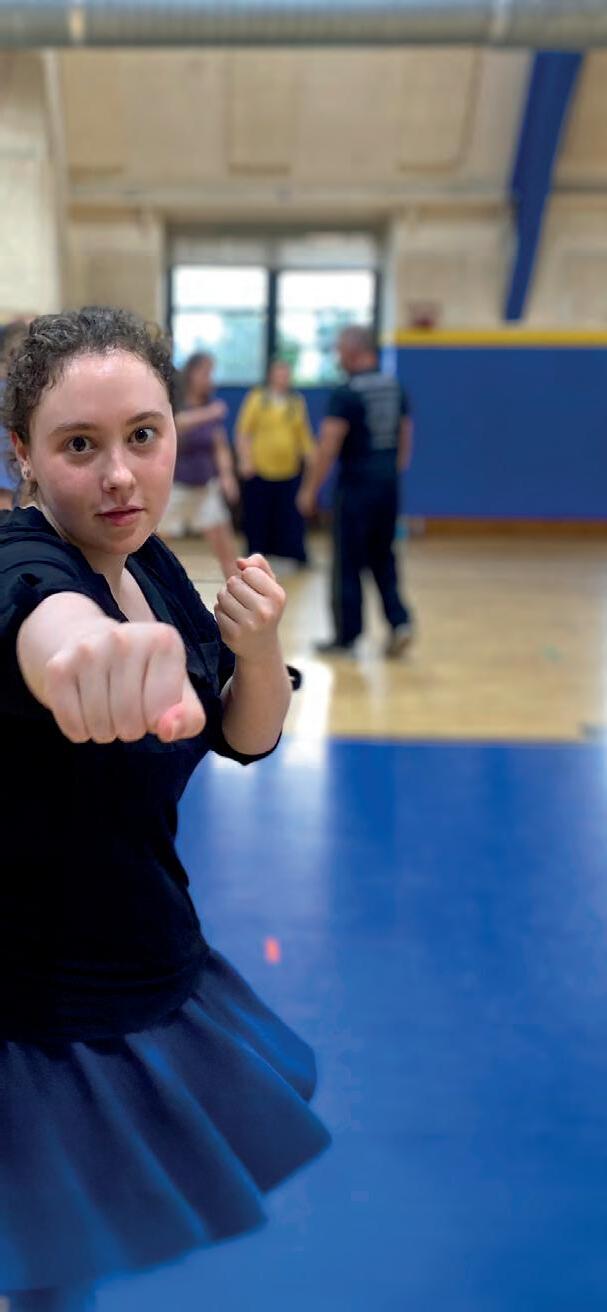

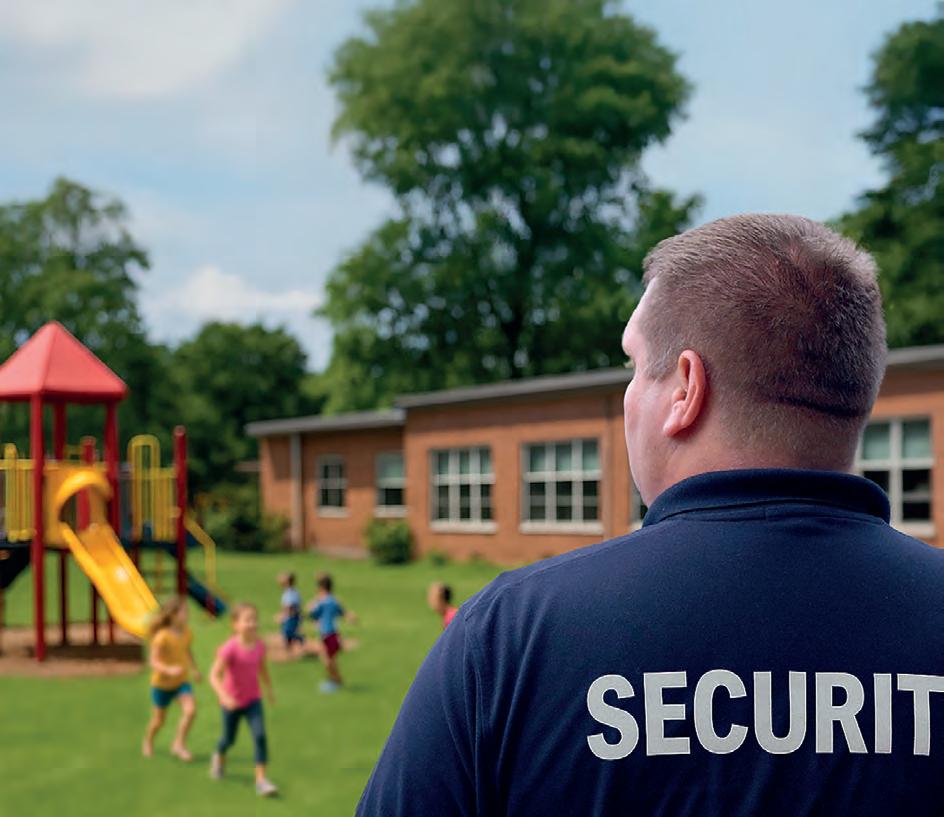
$5 million in government grants since 2020
